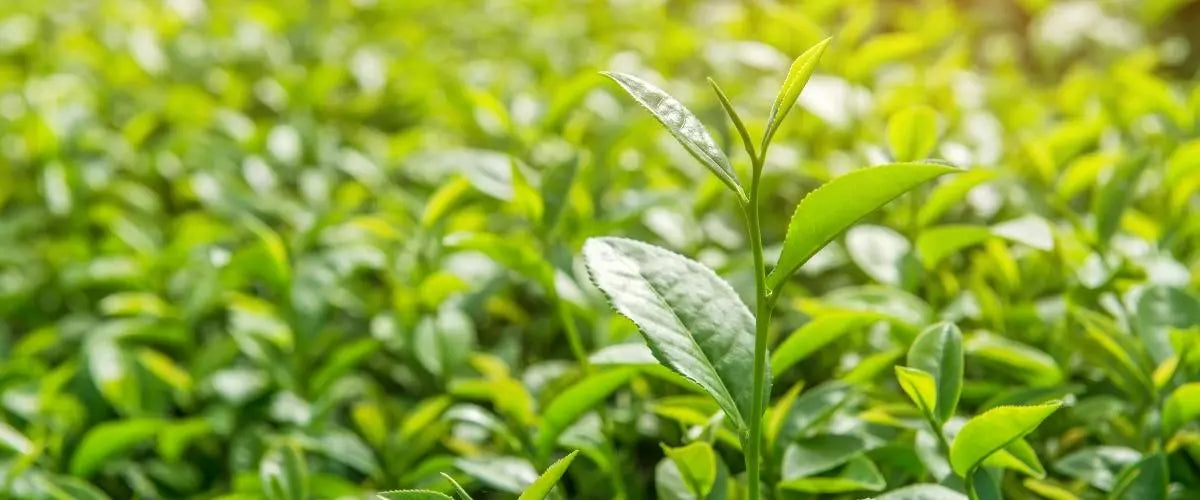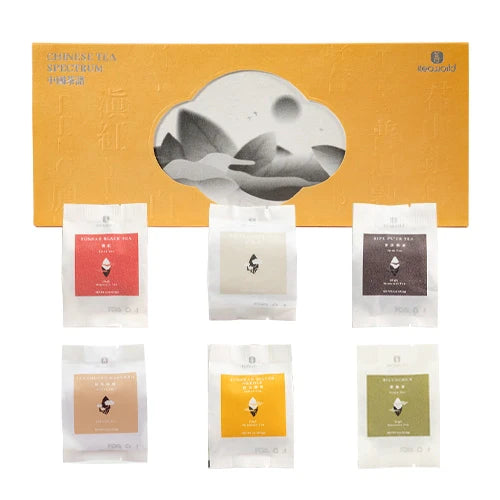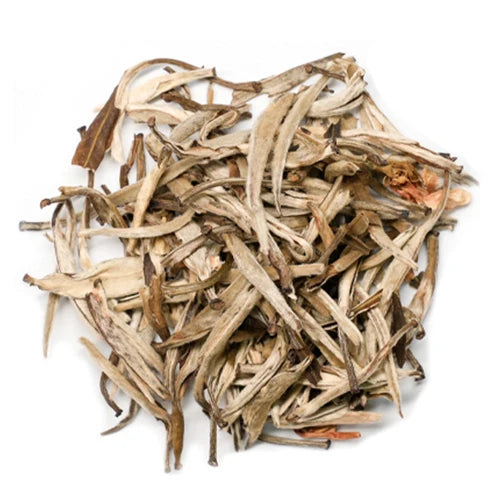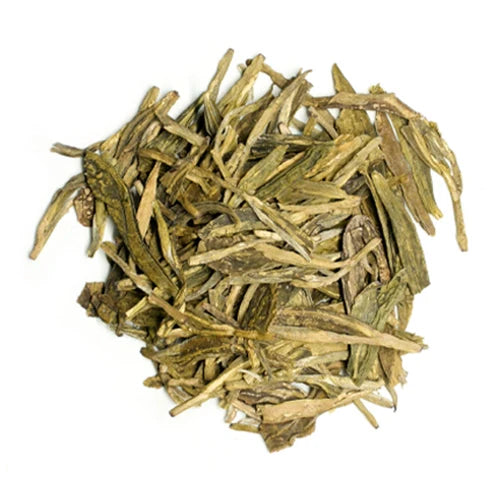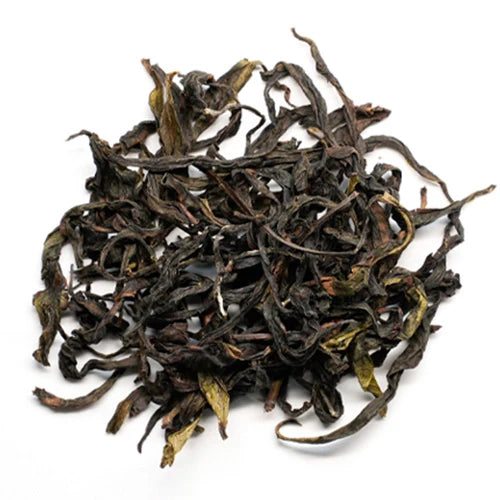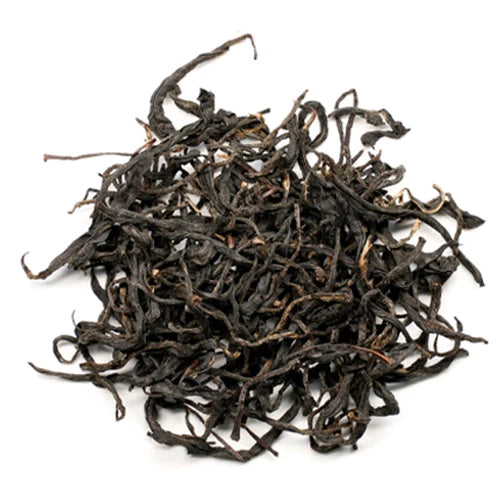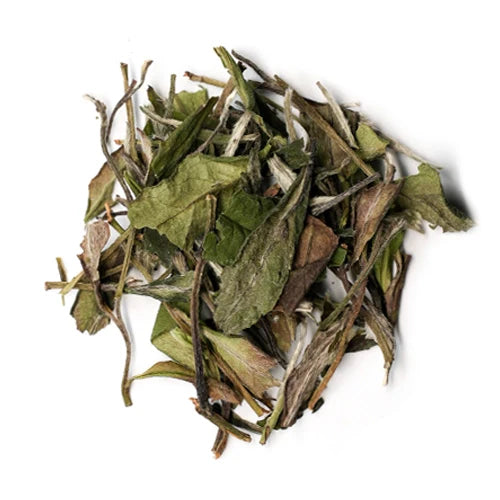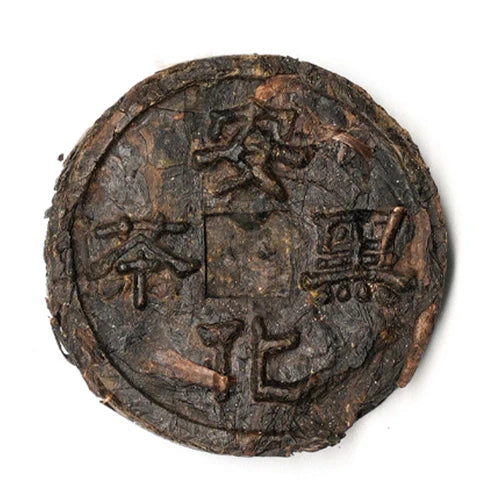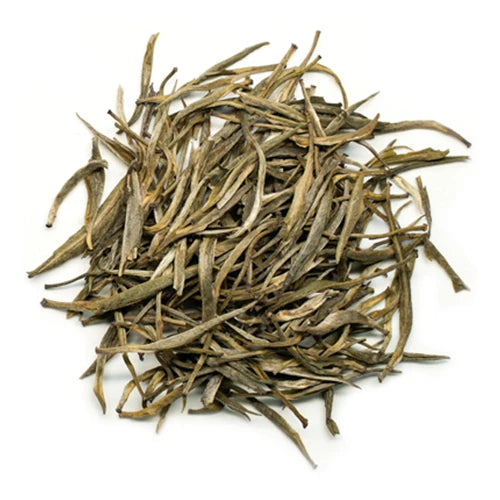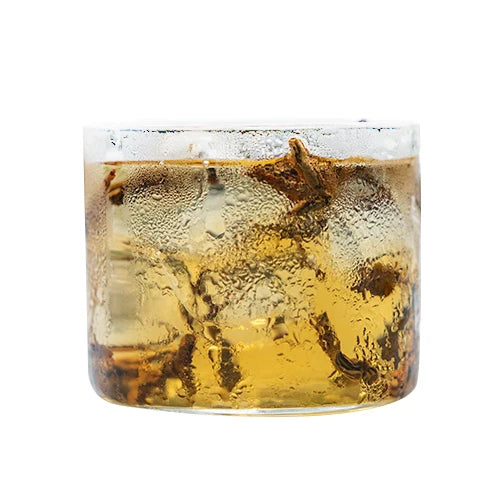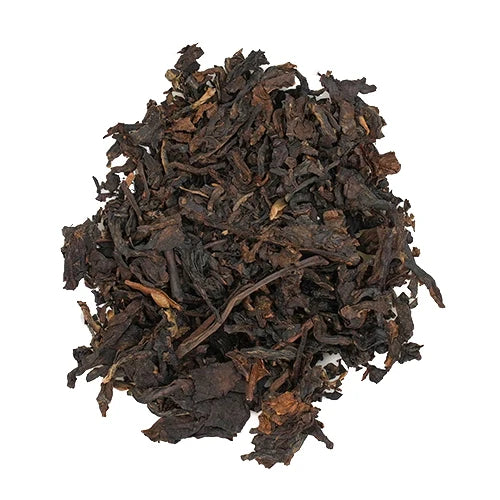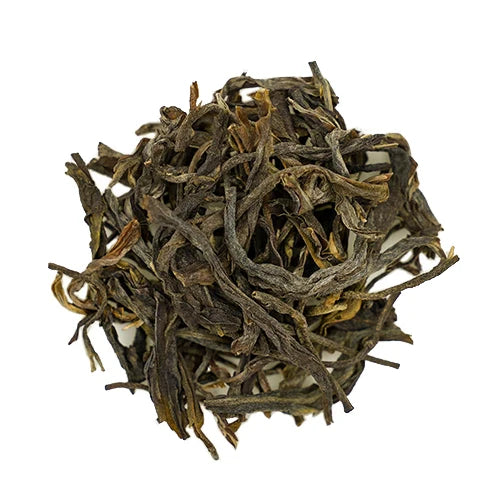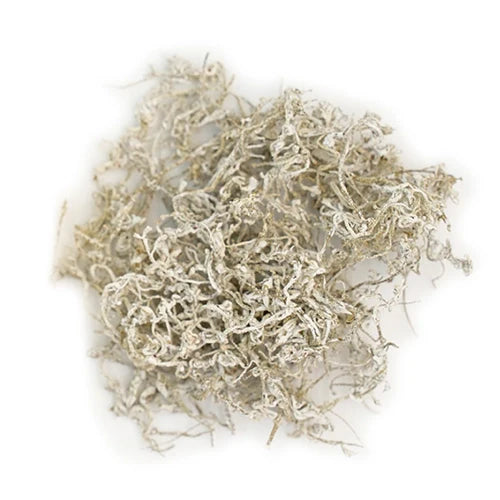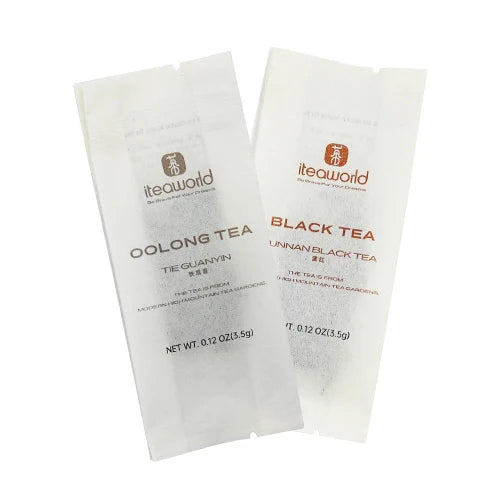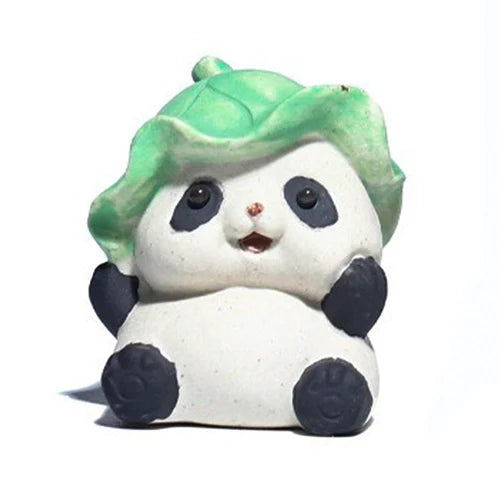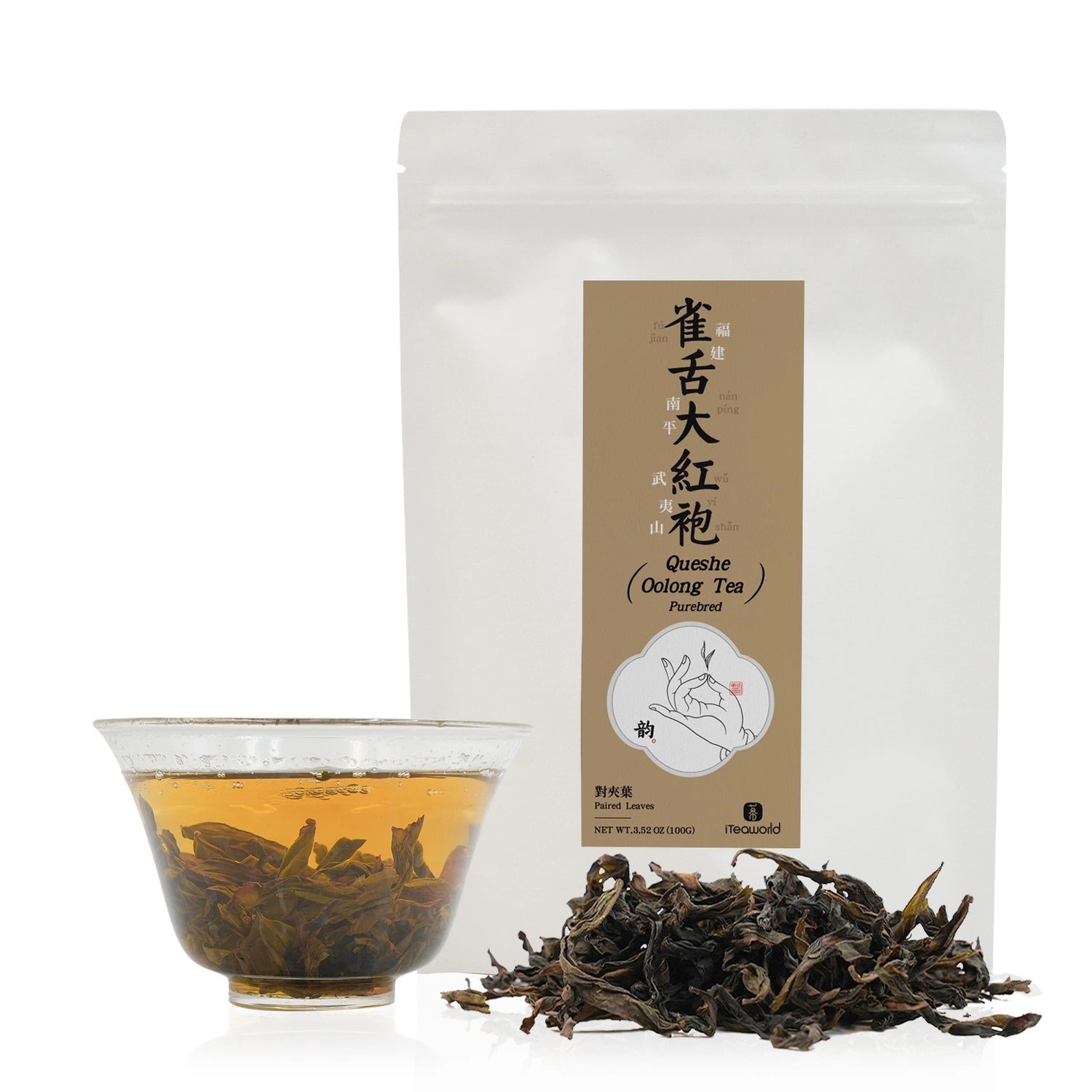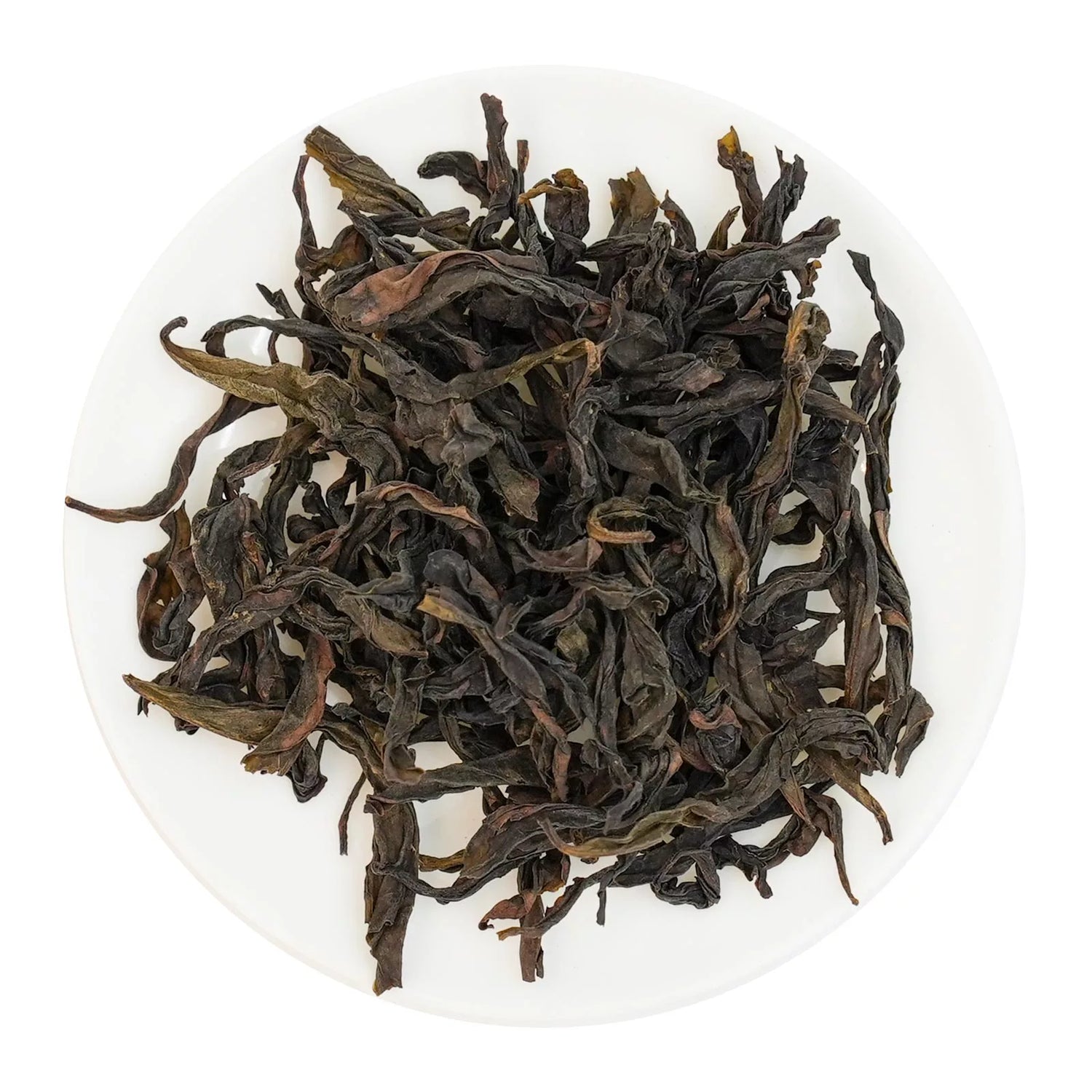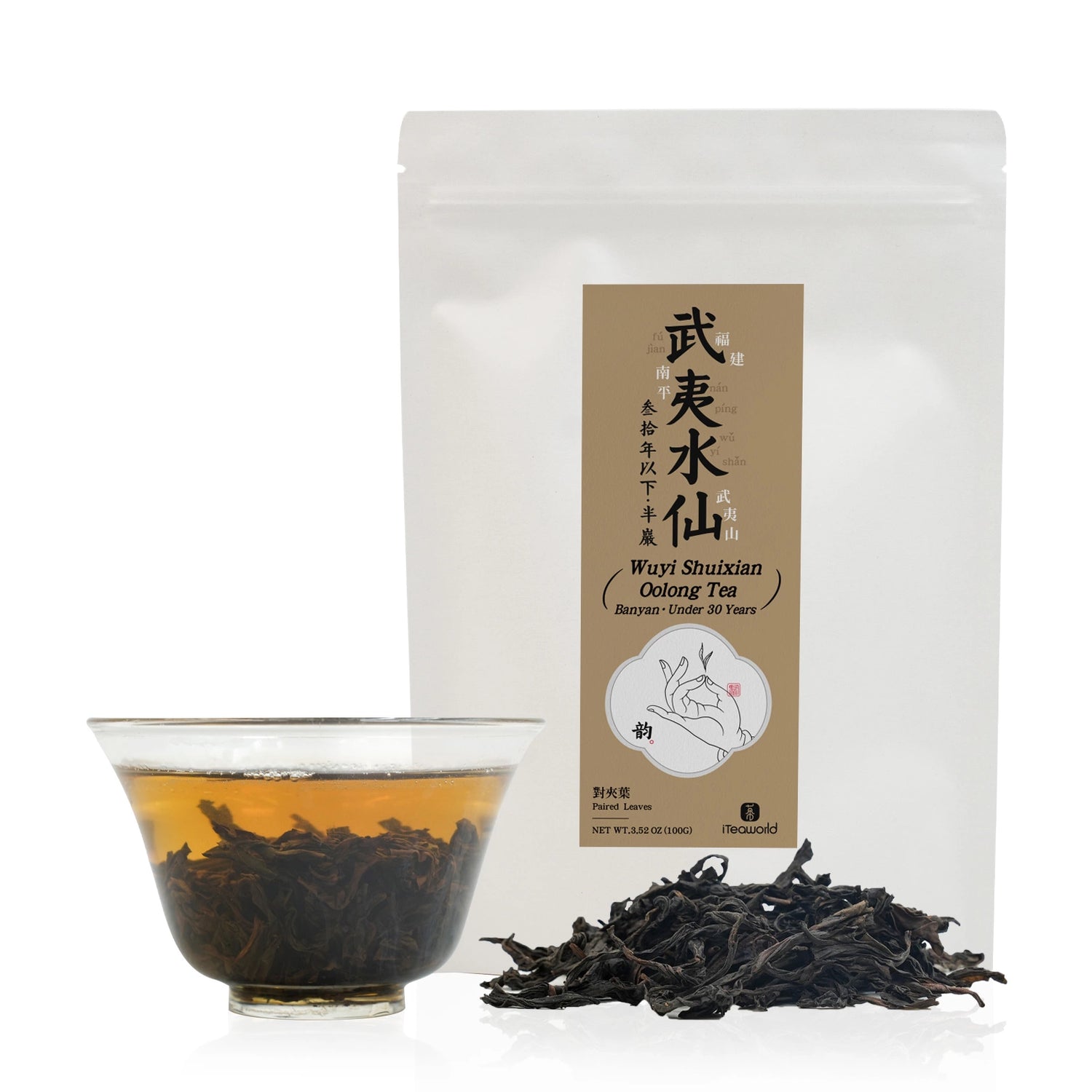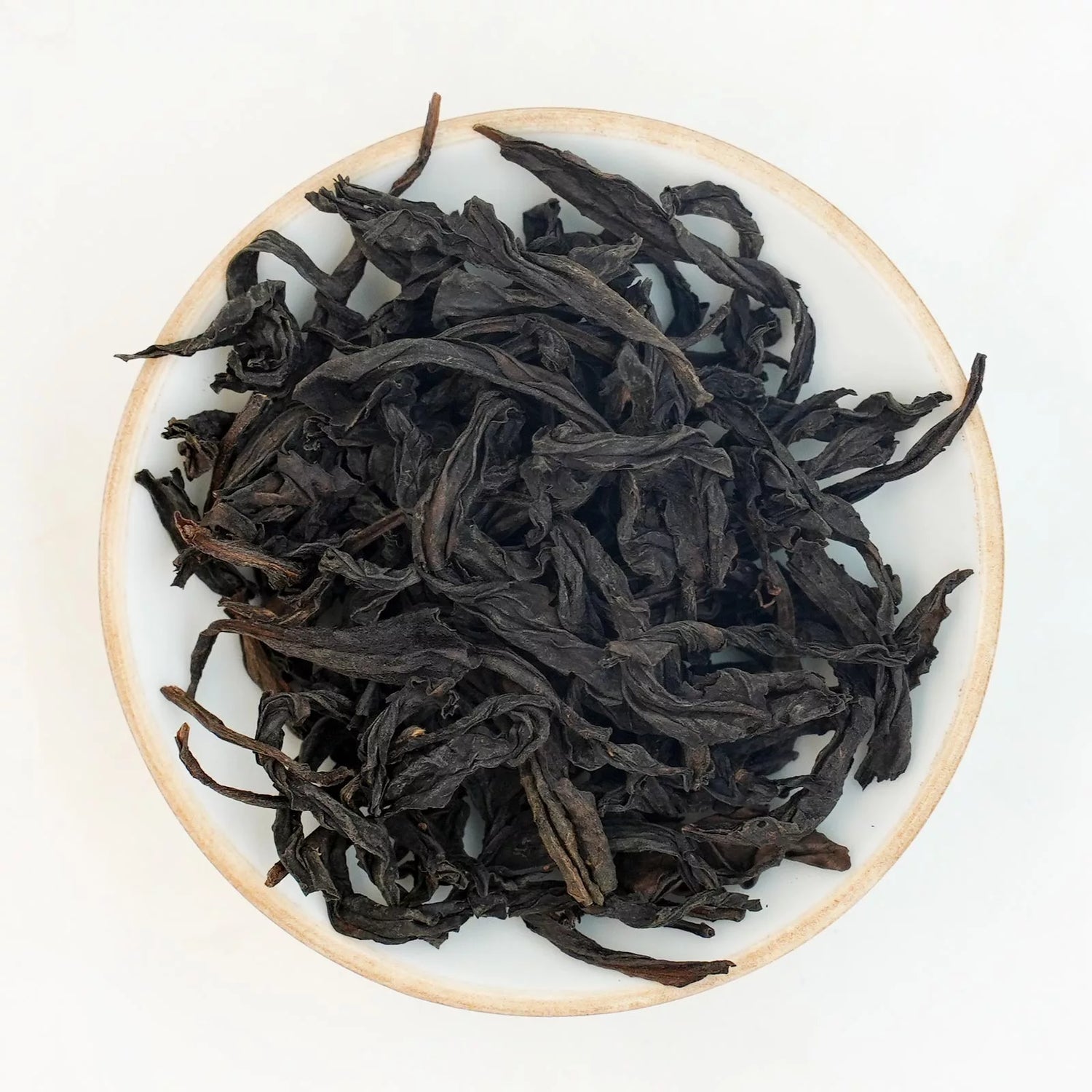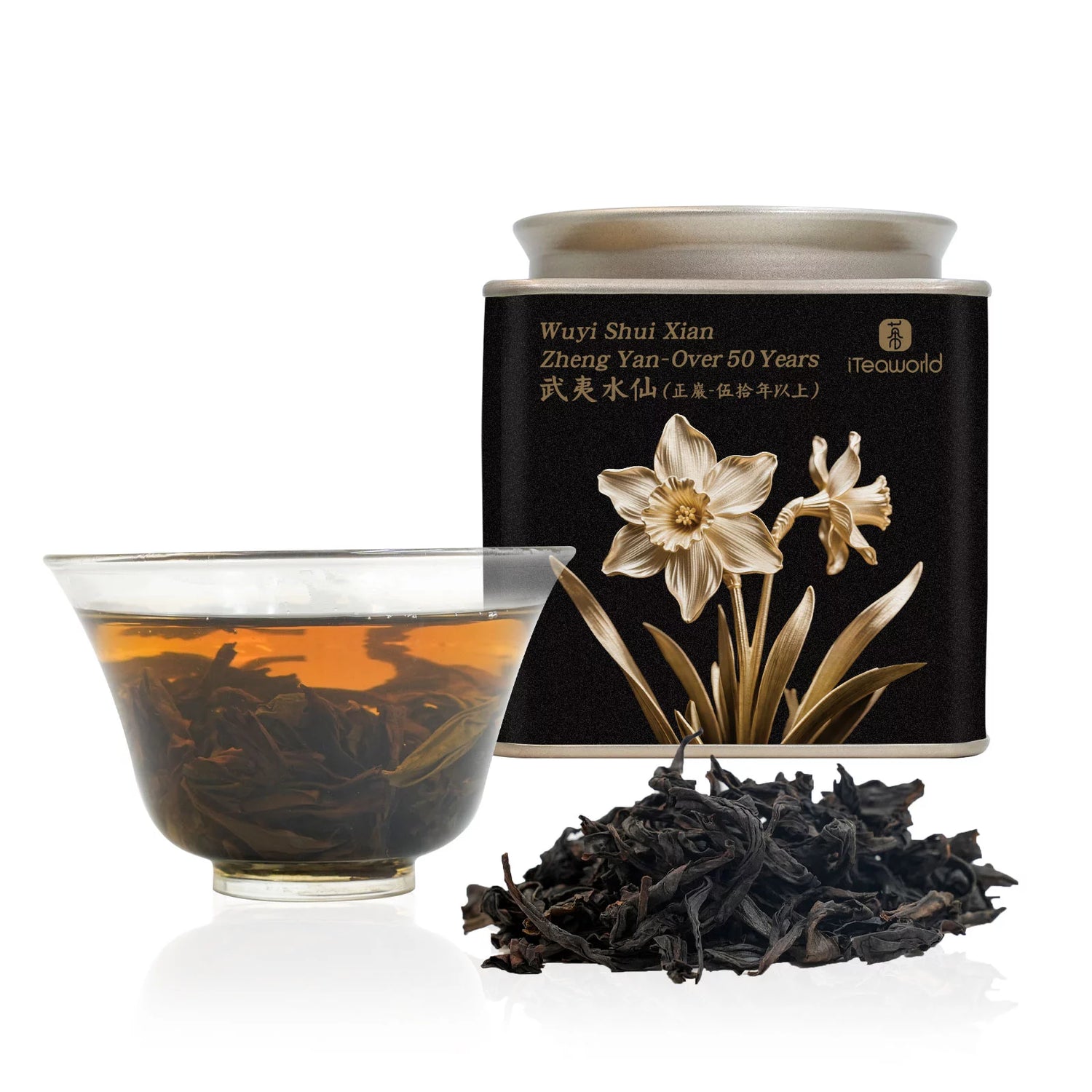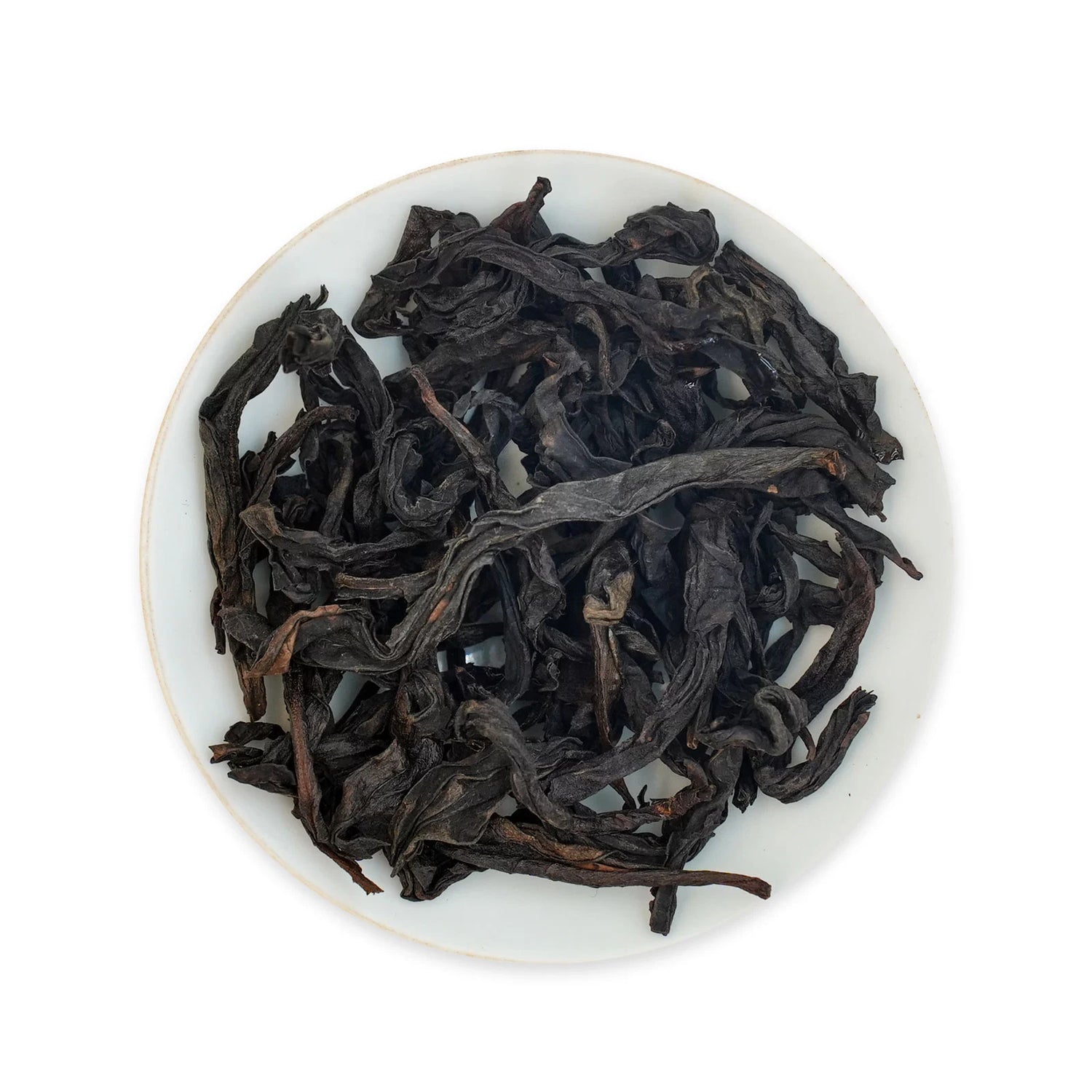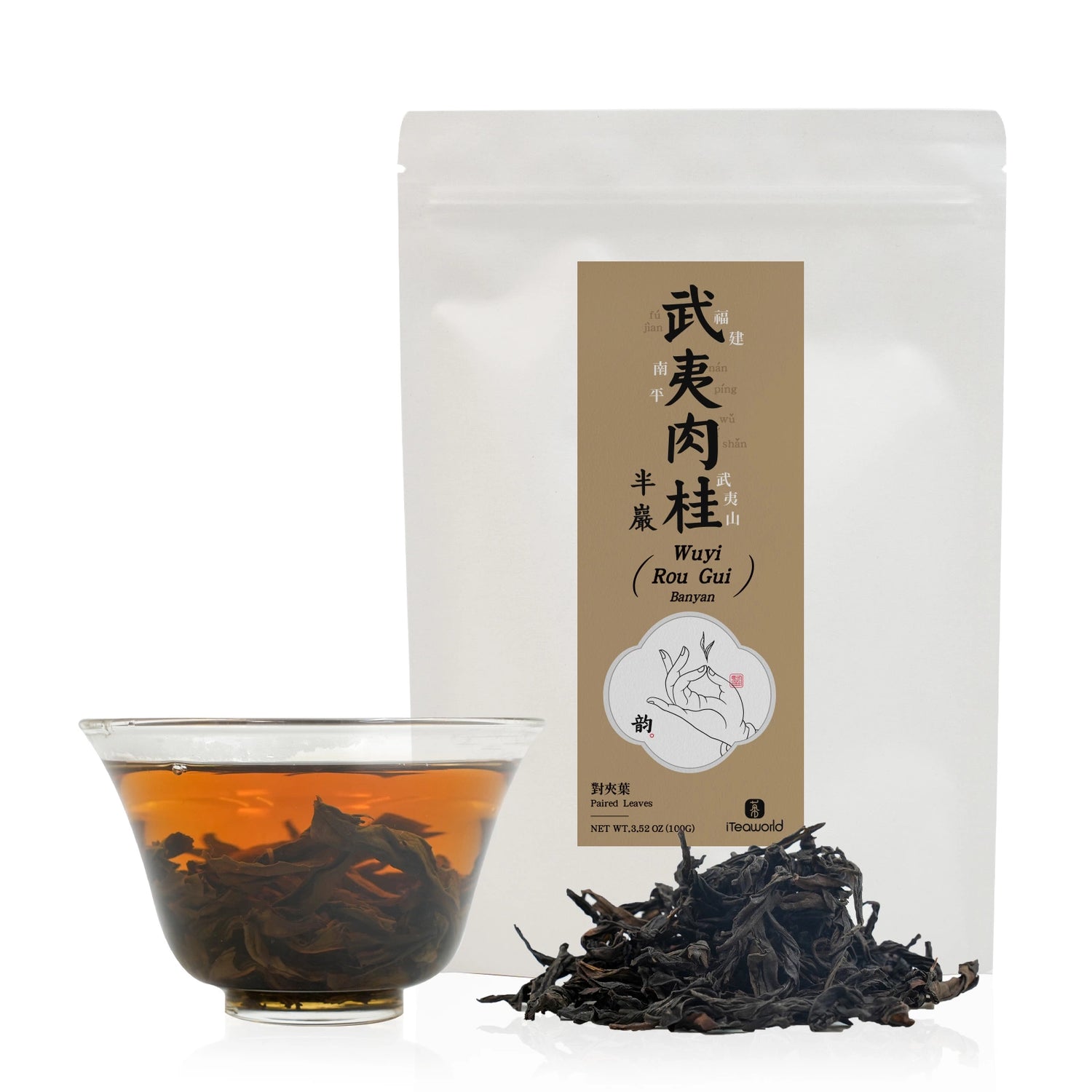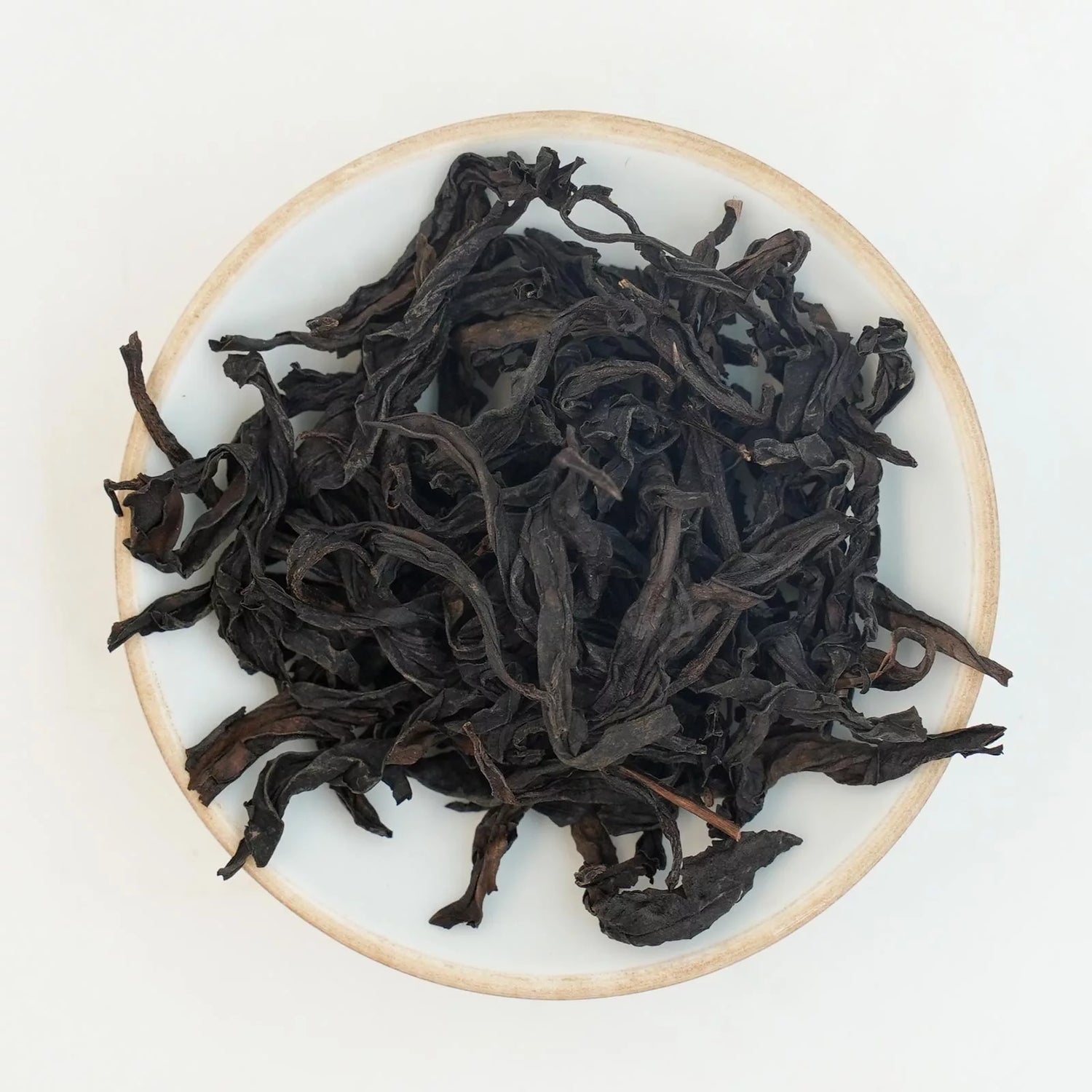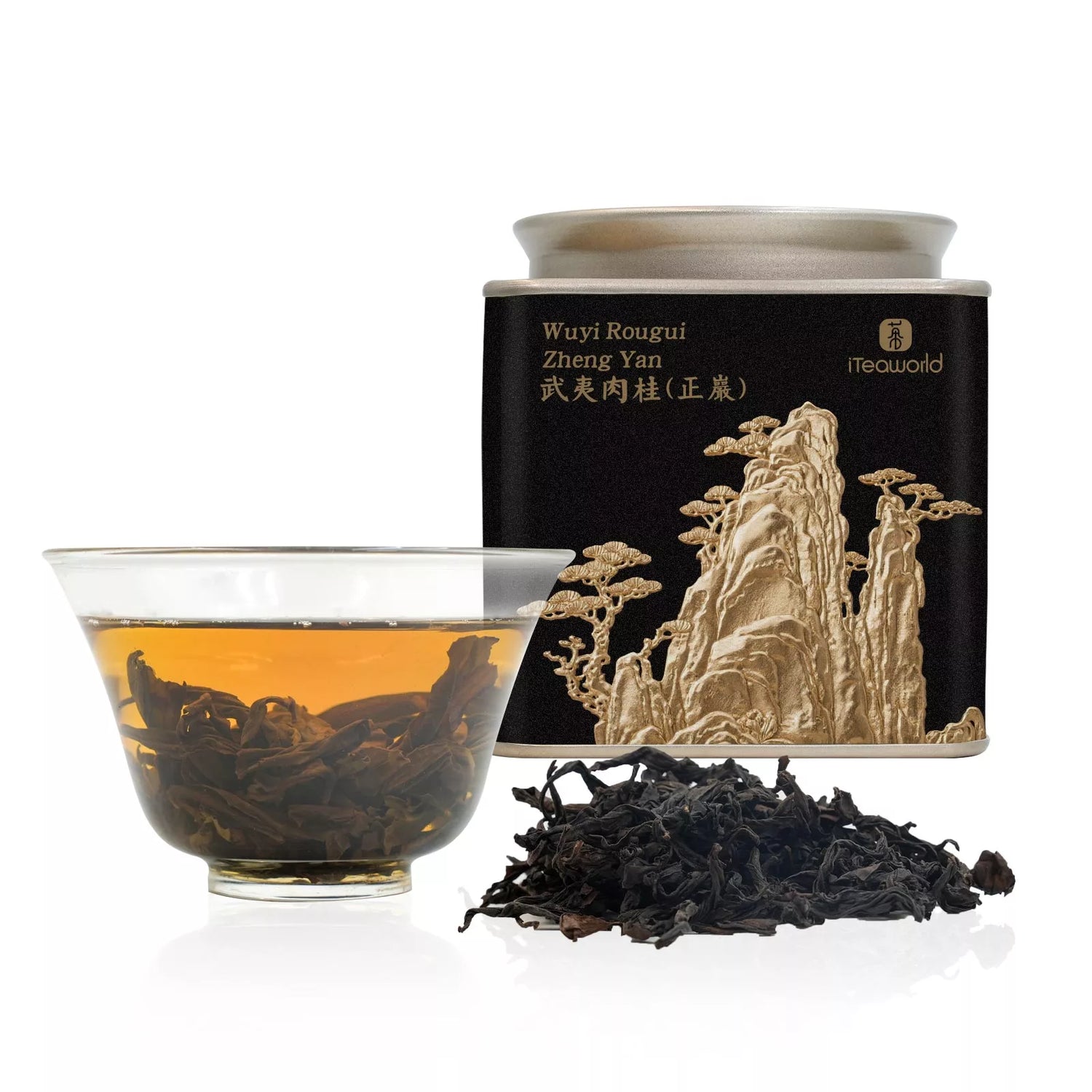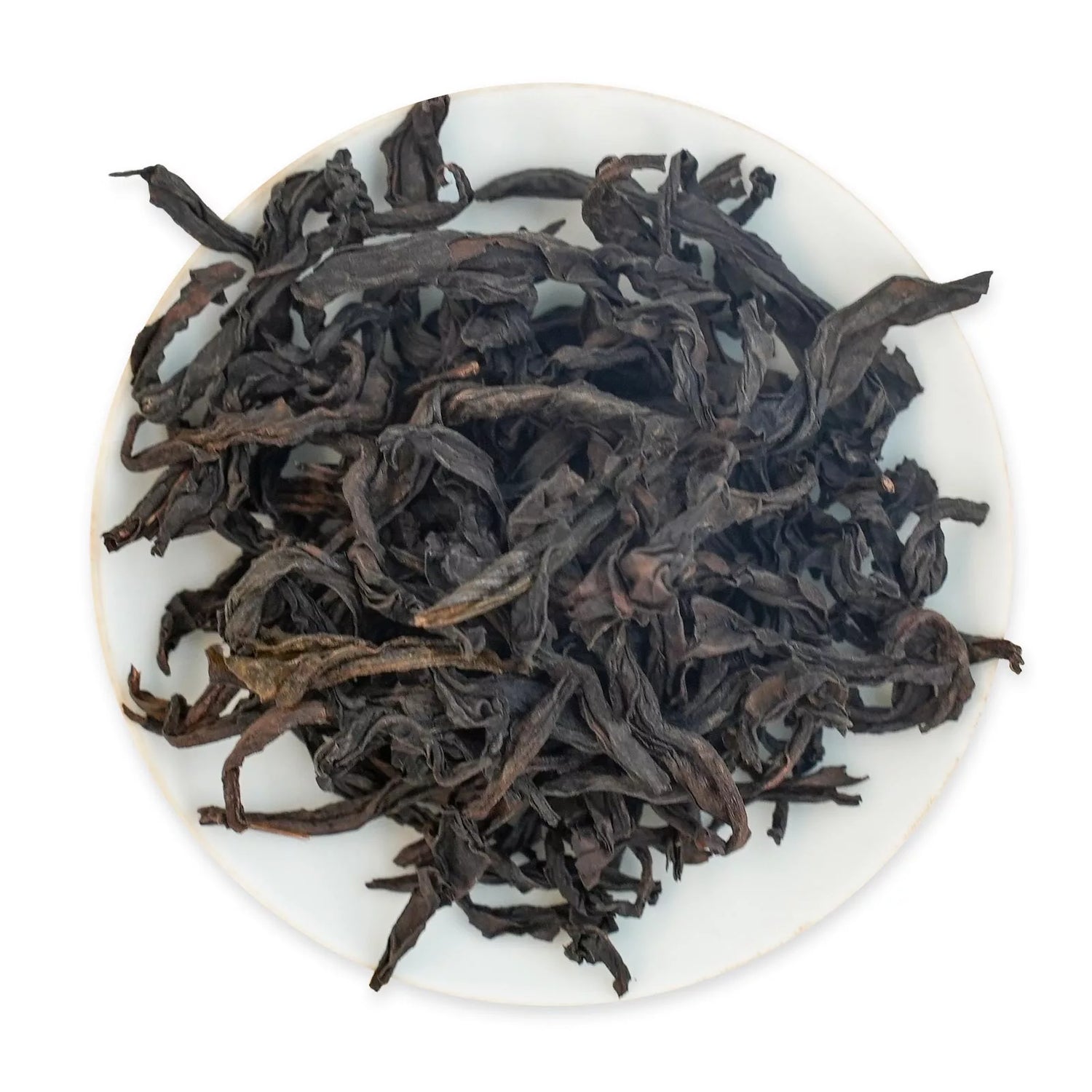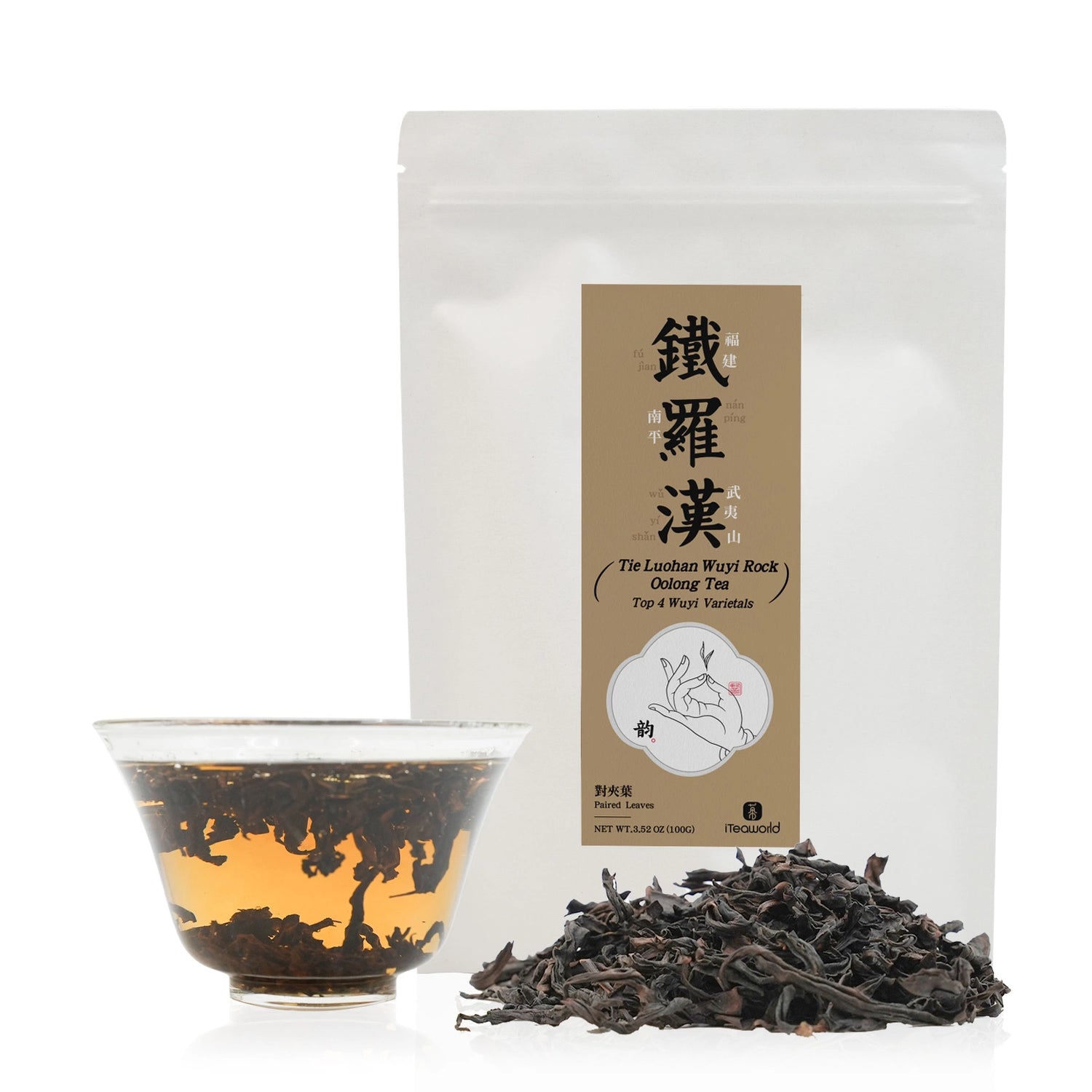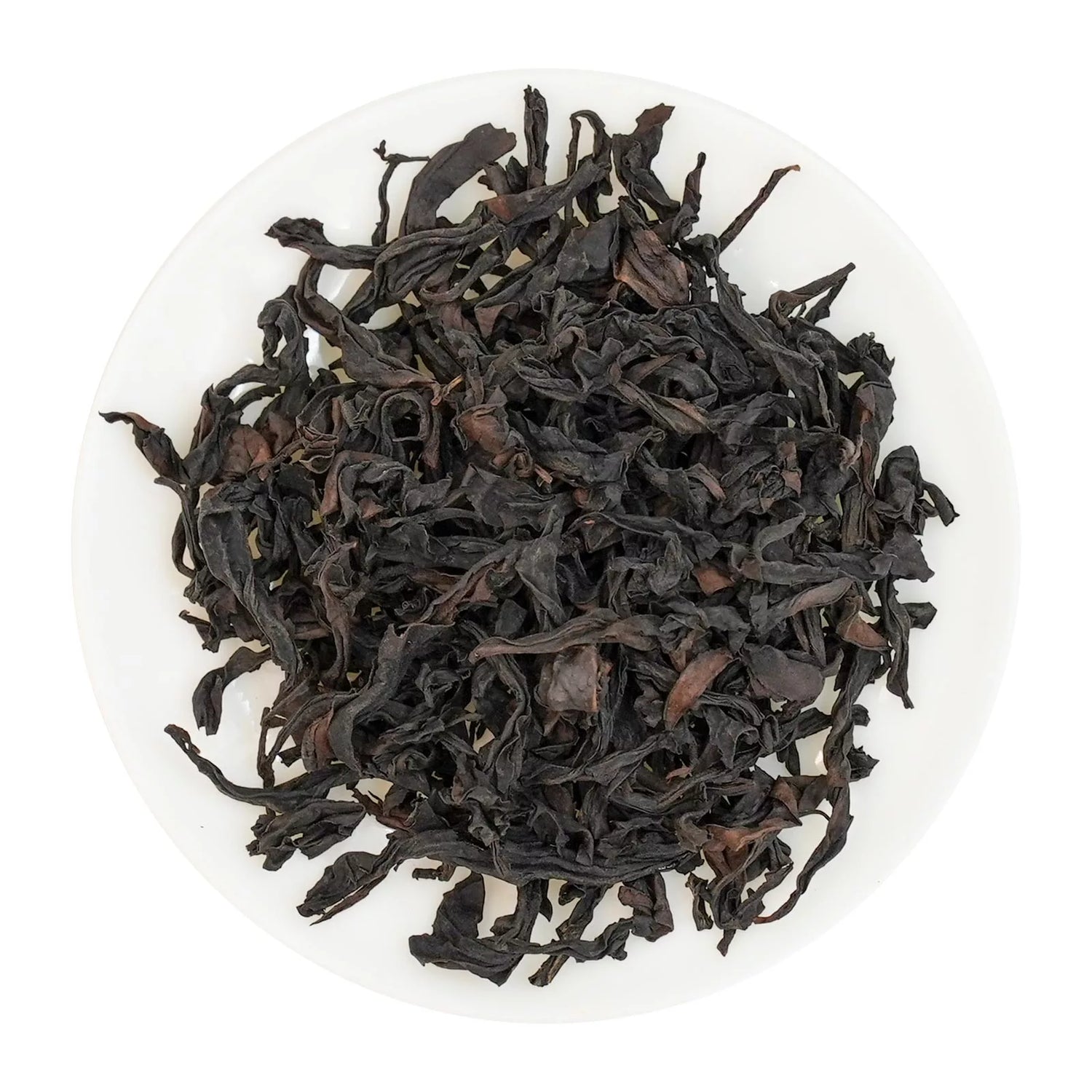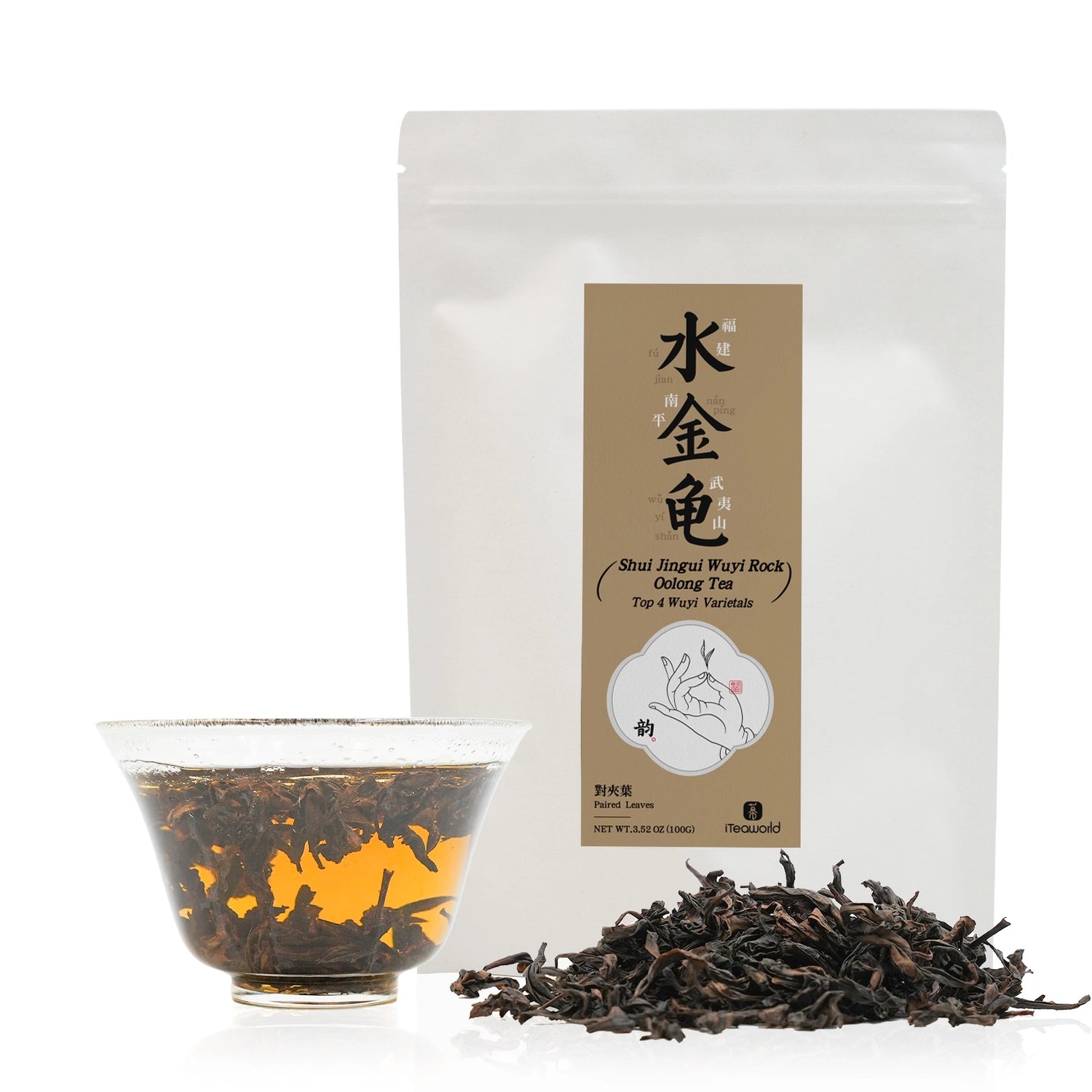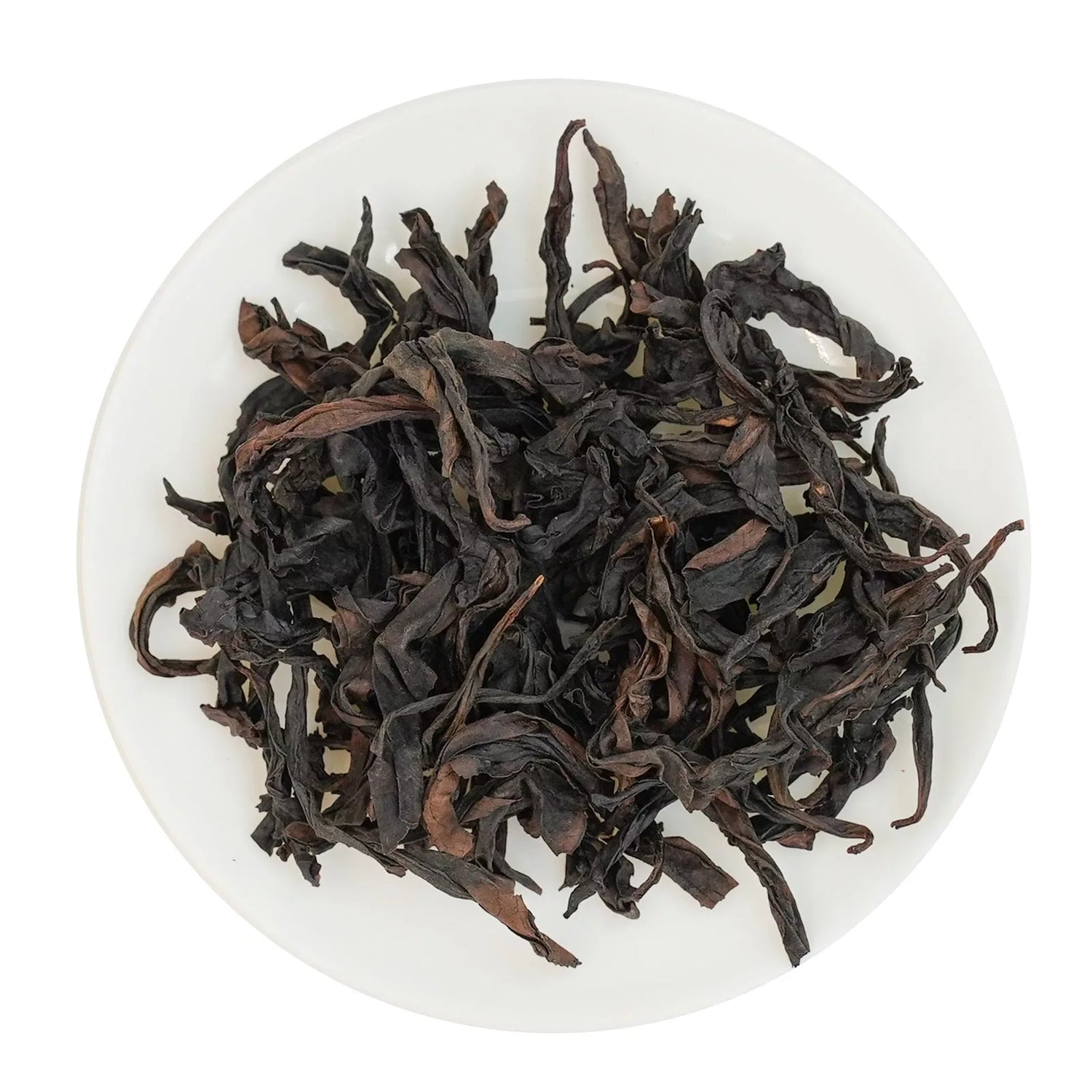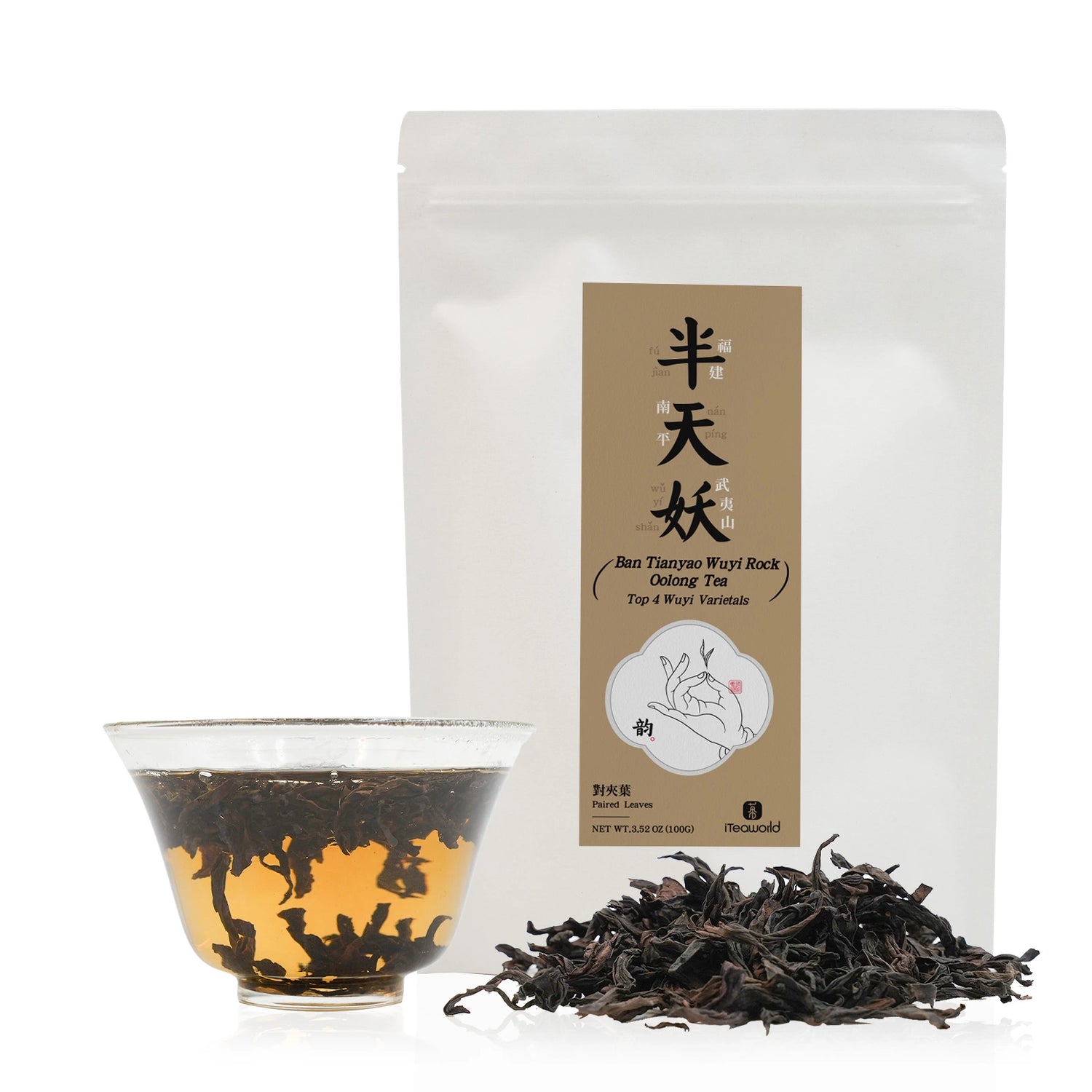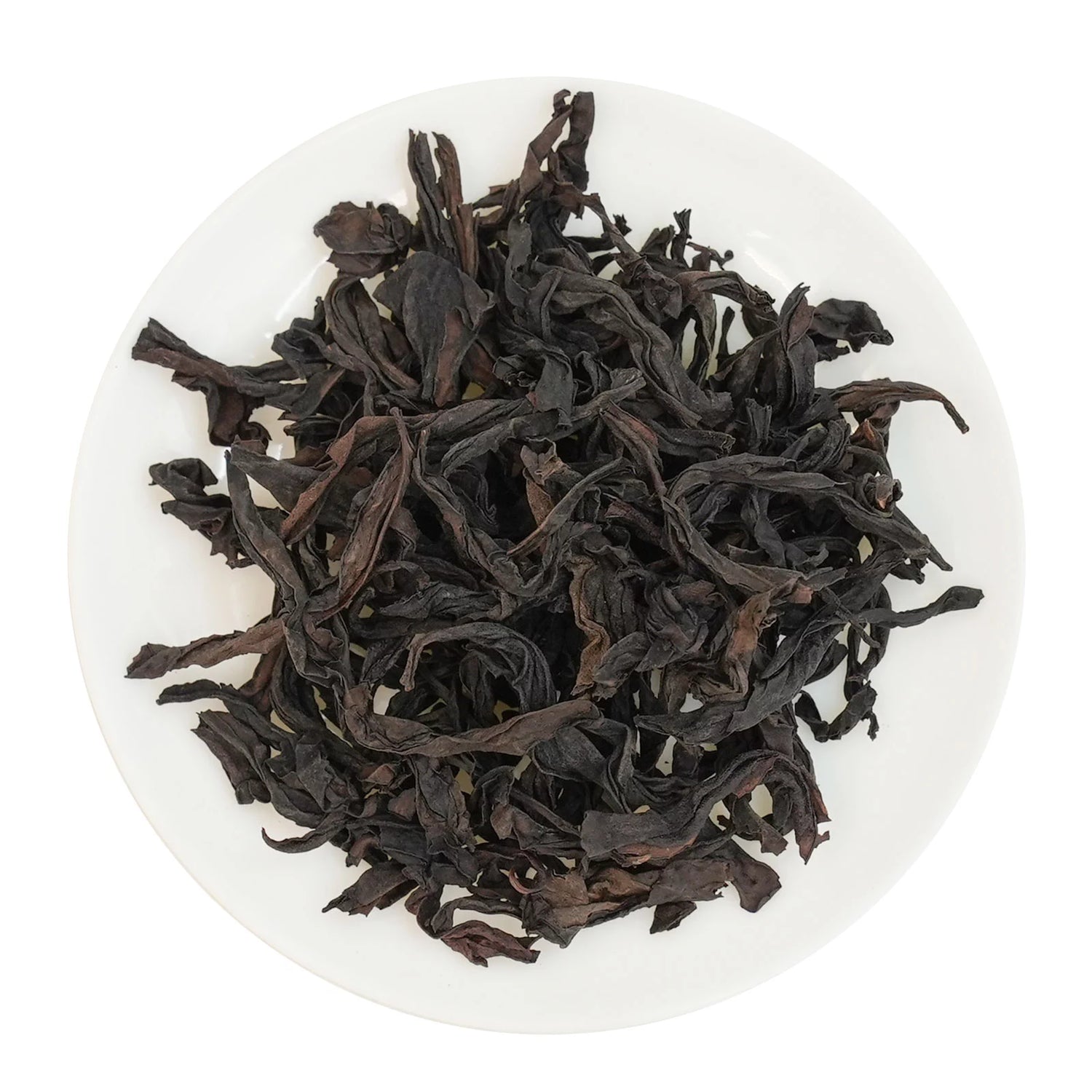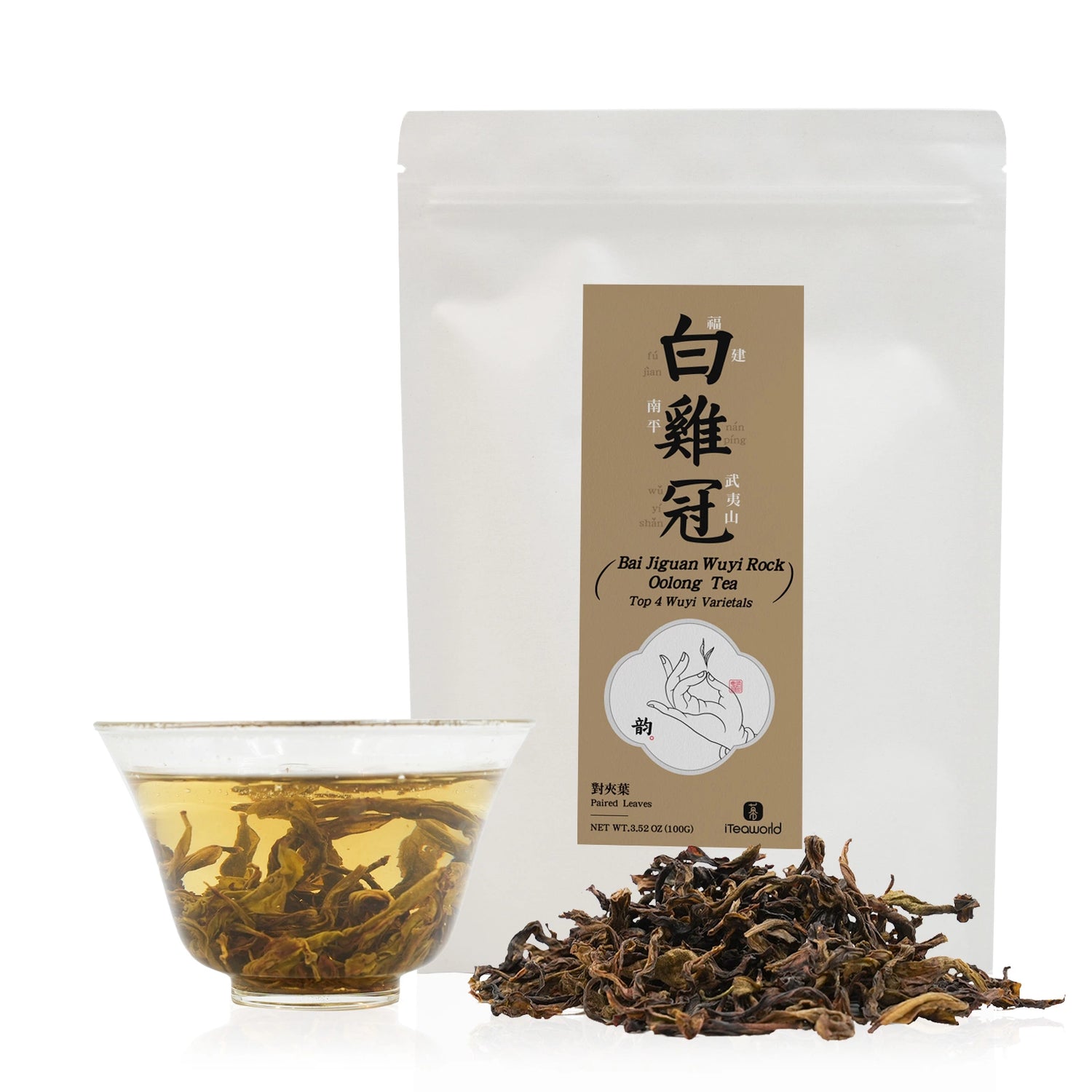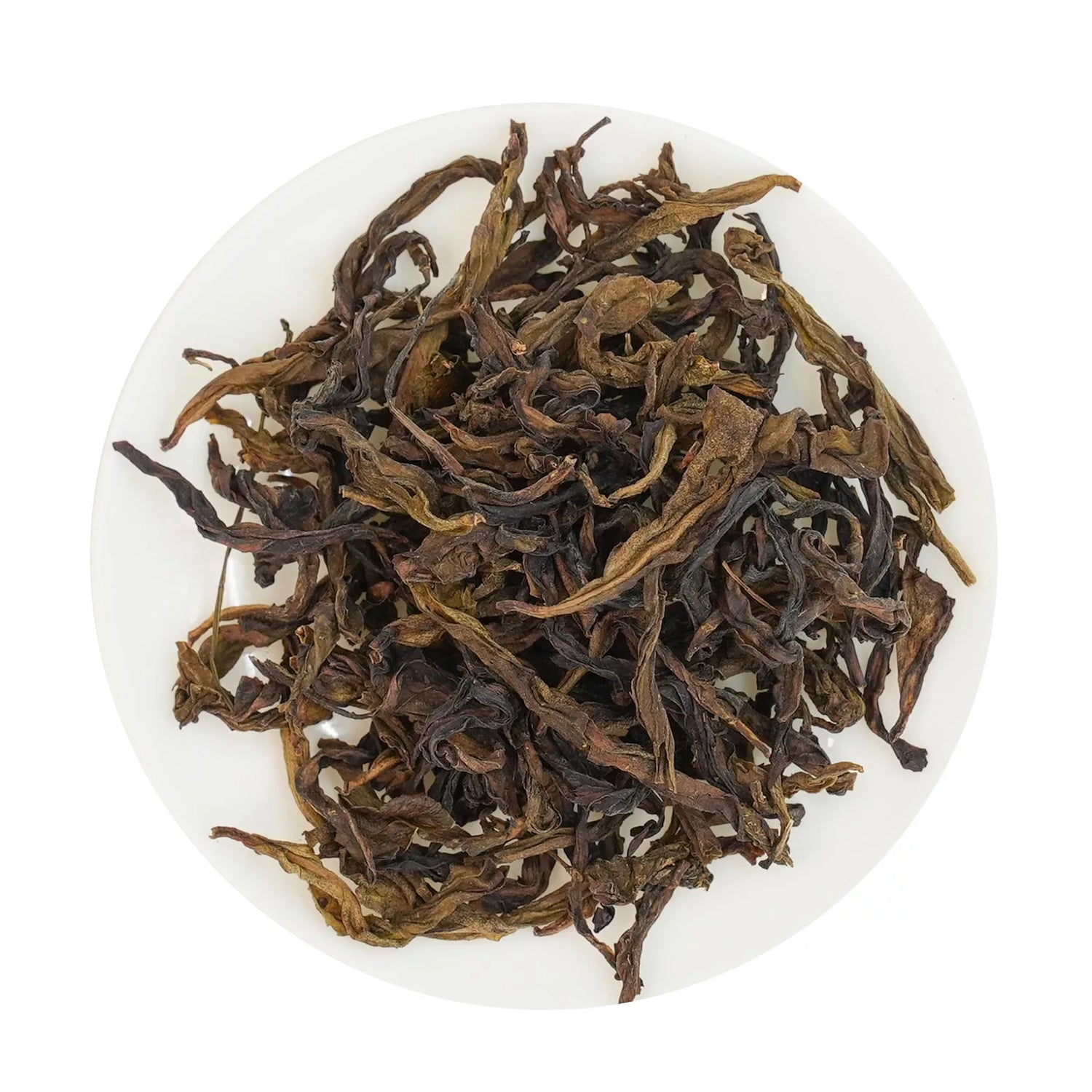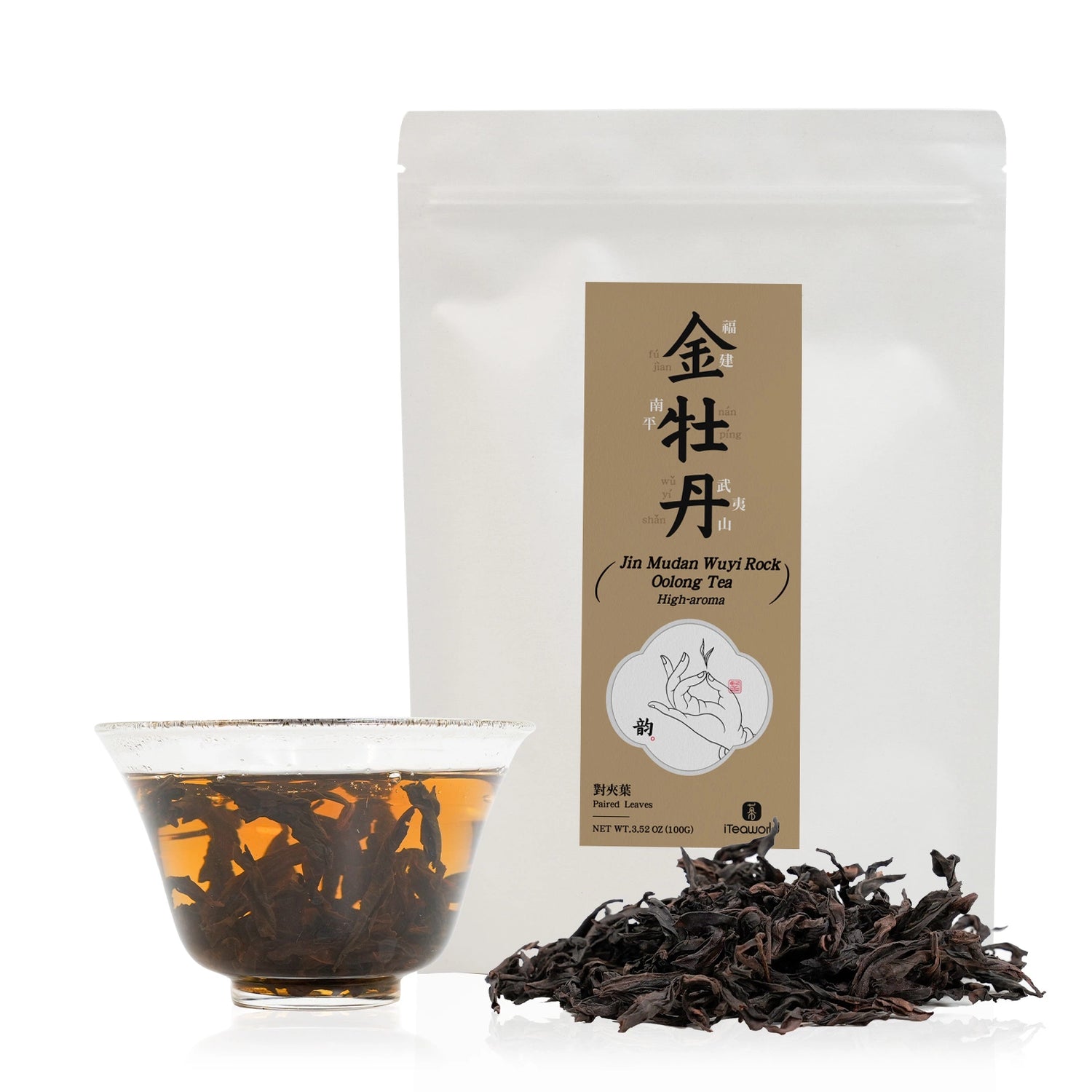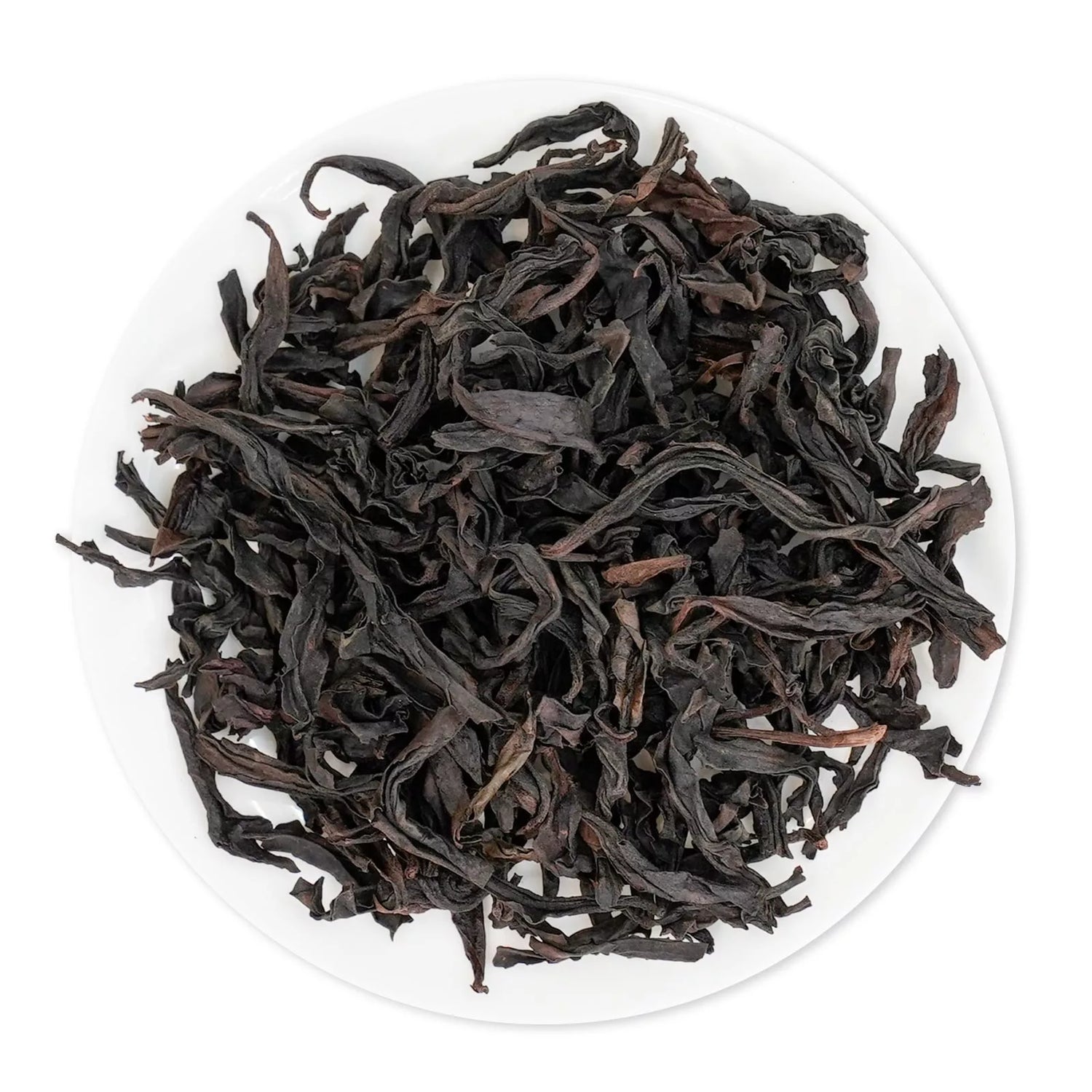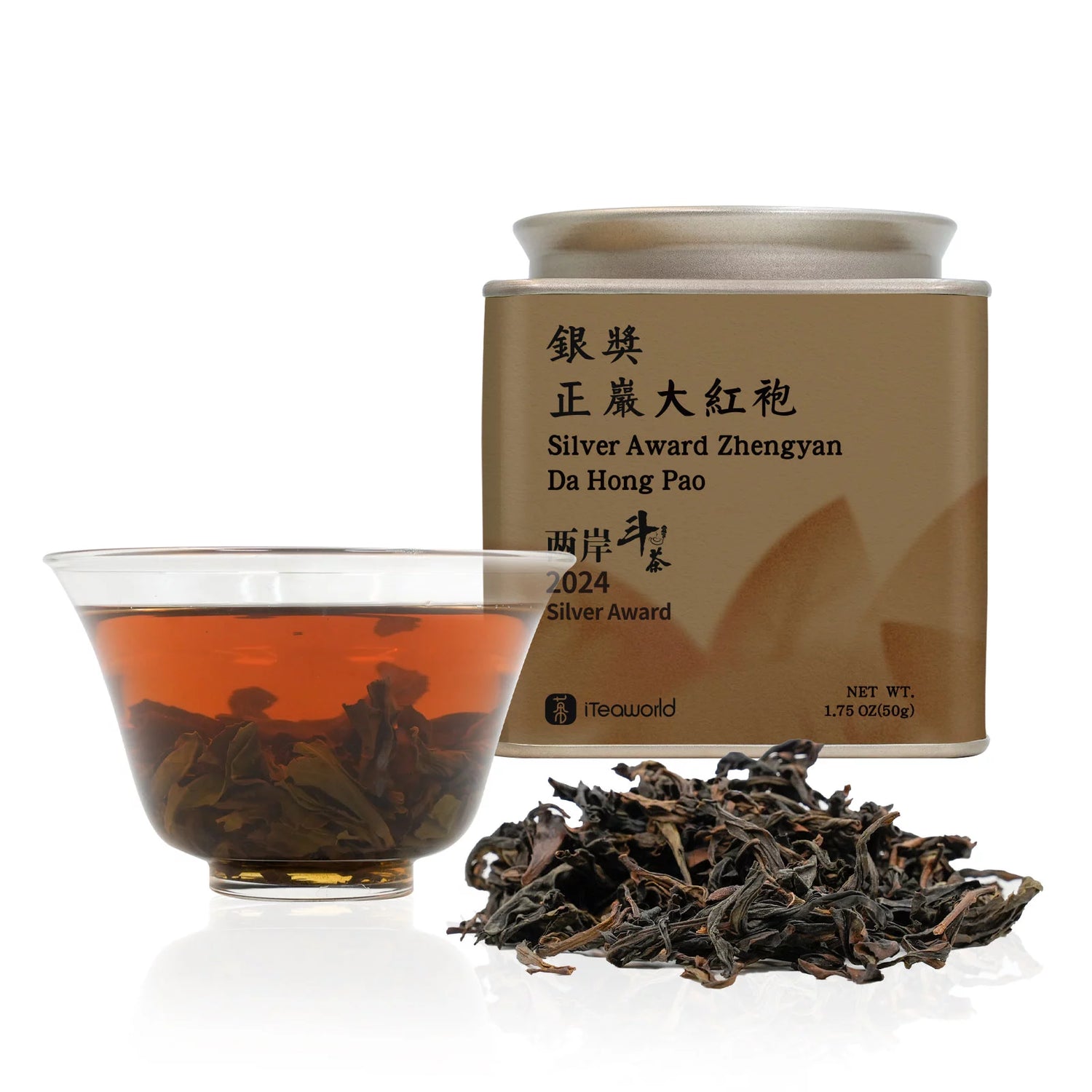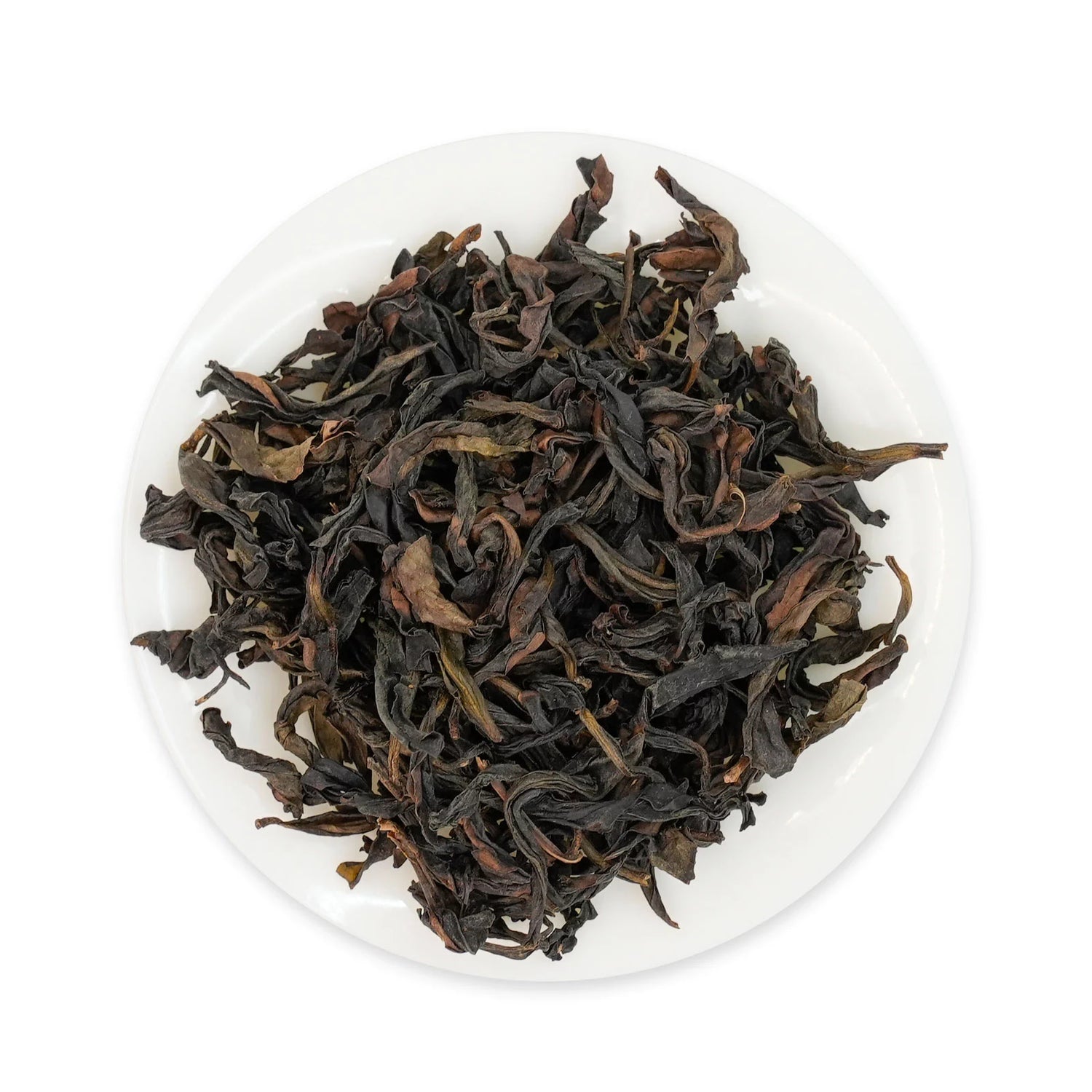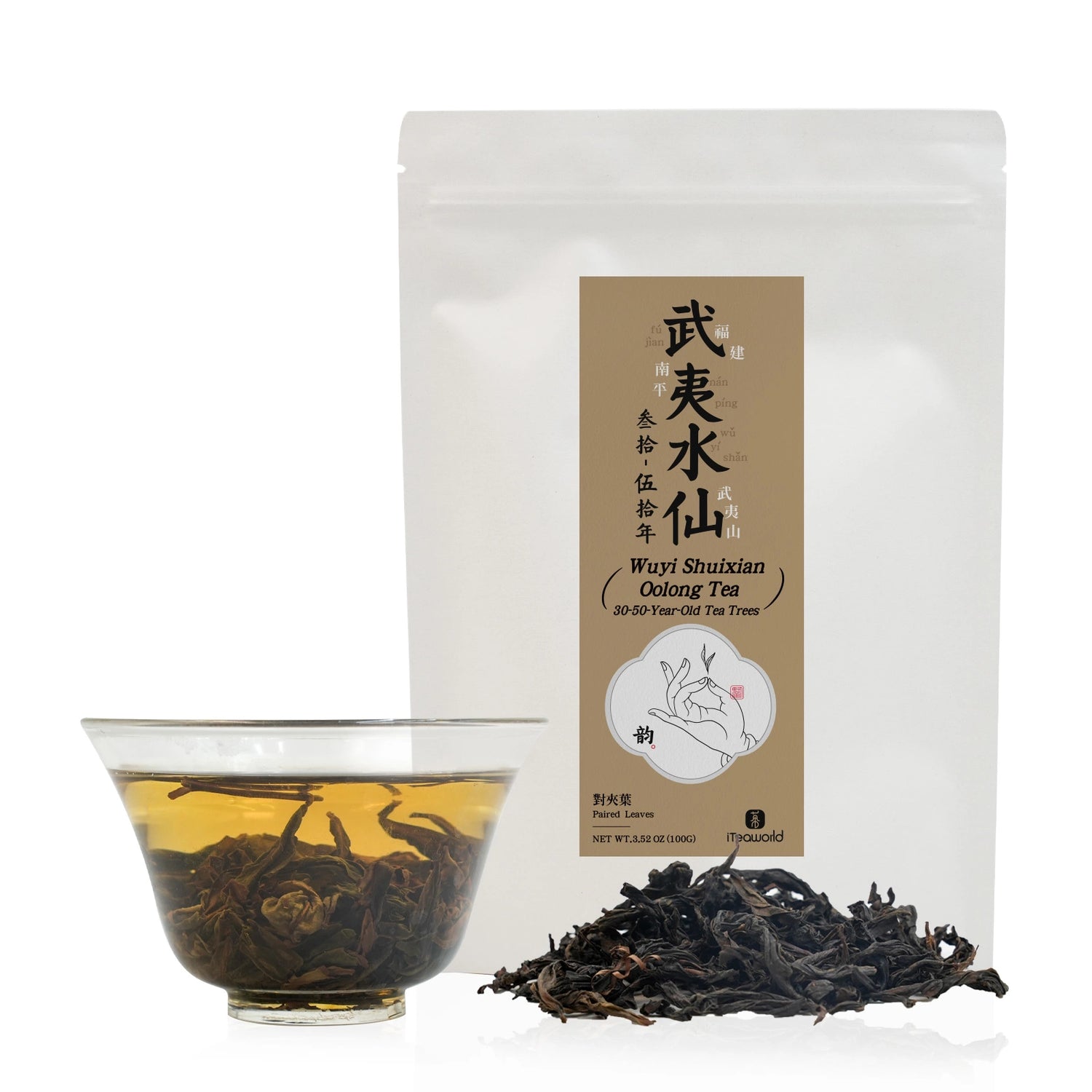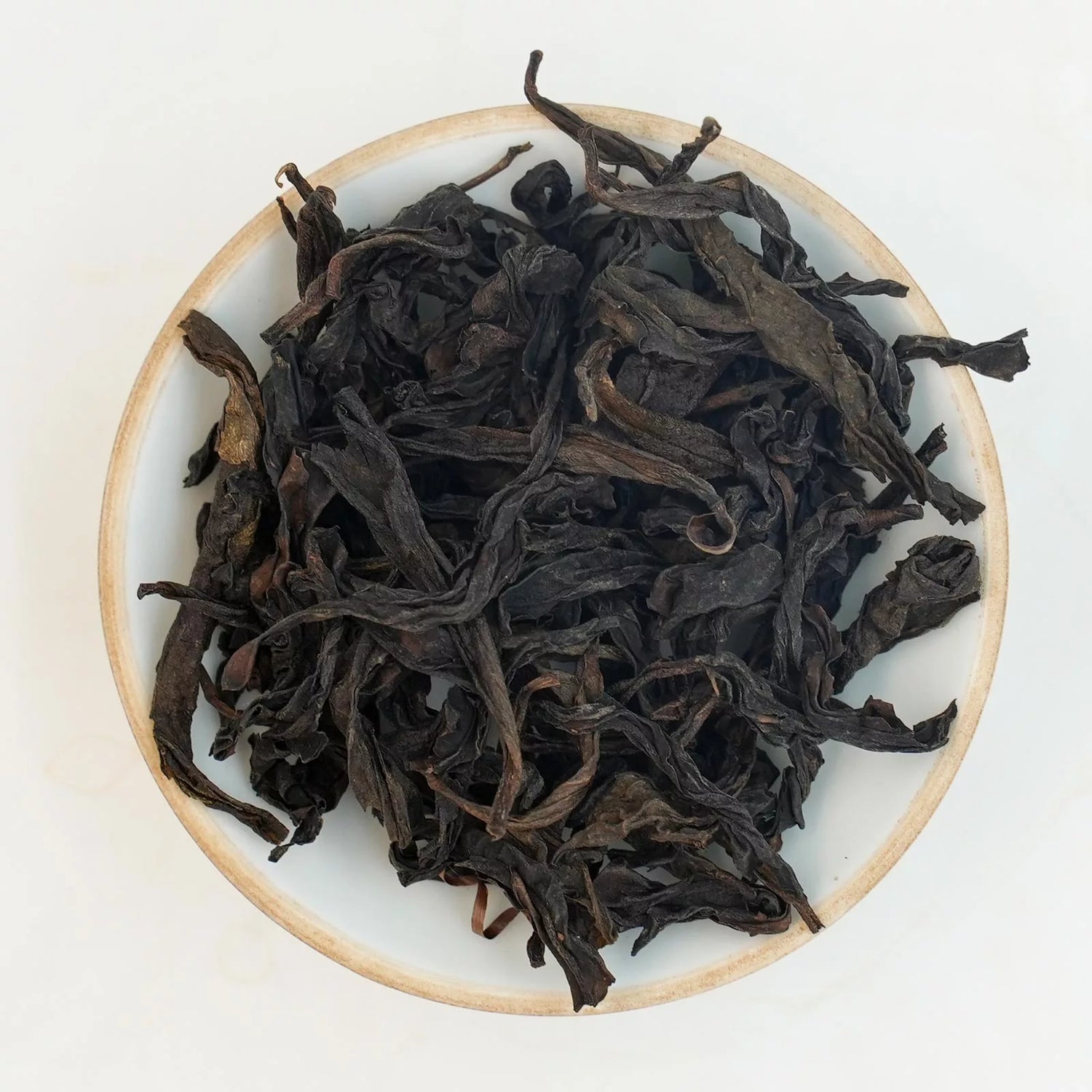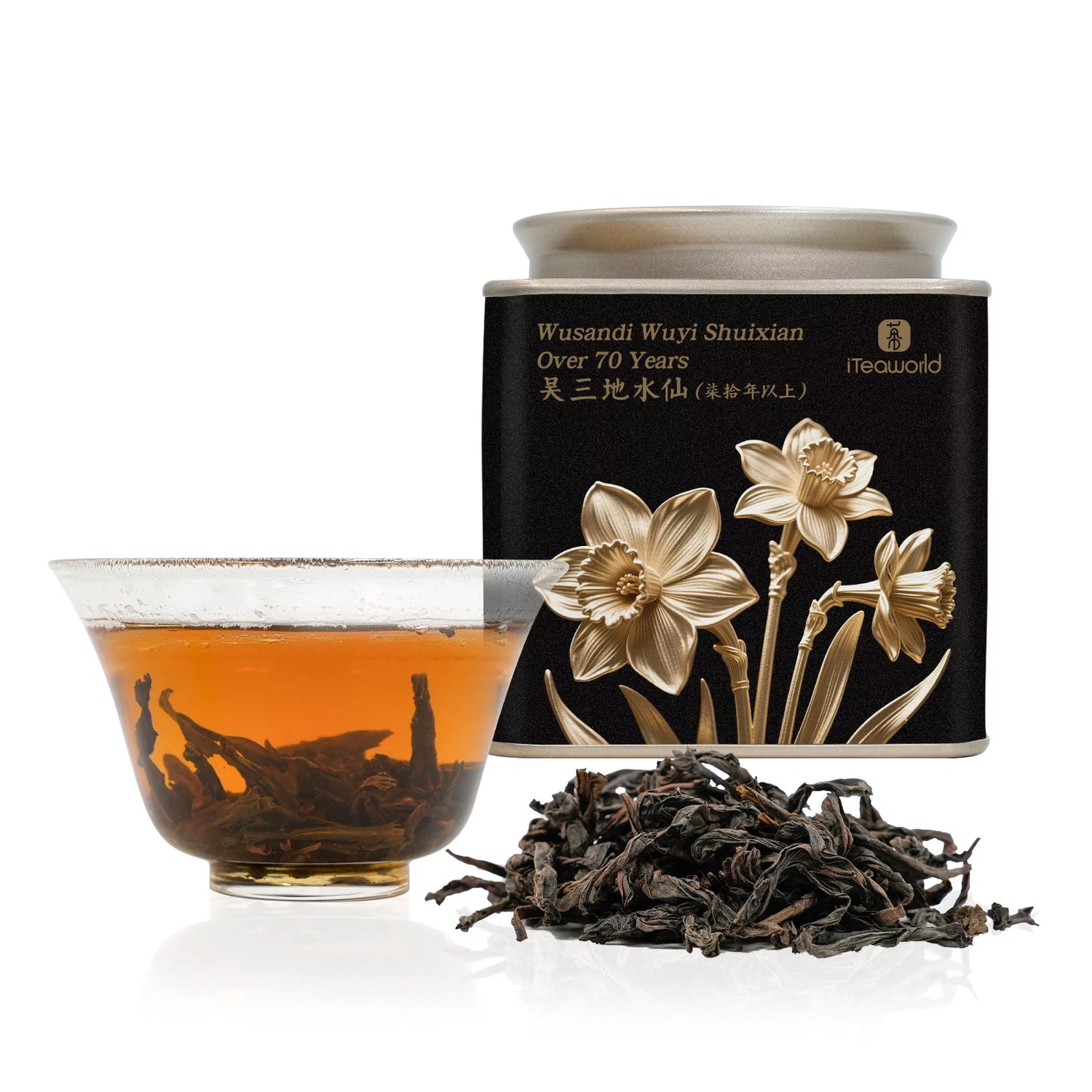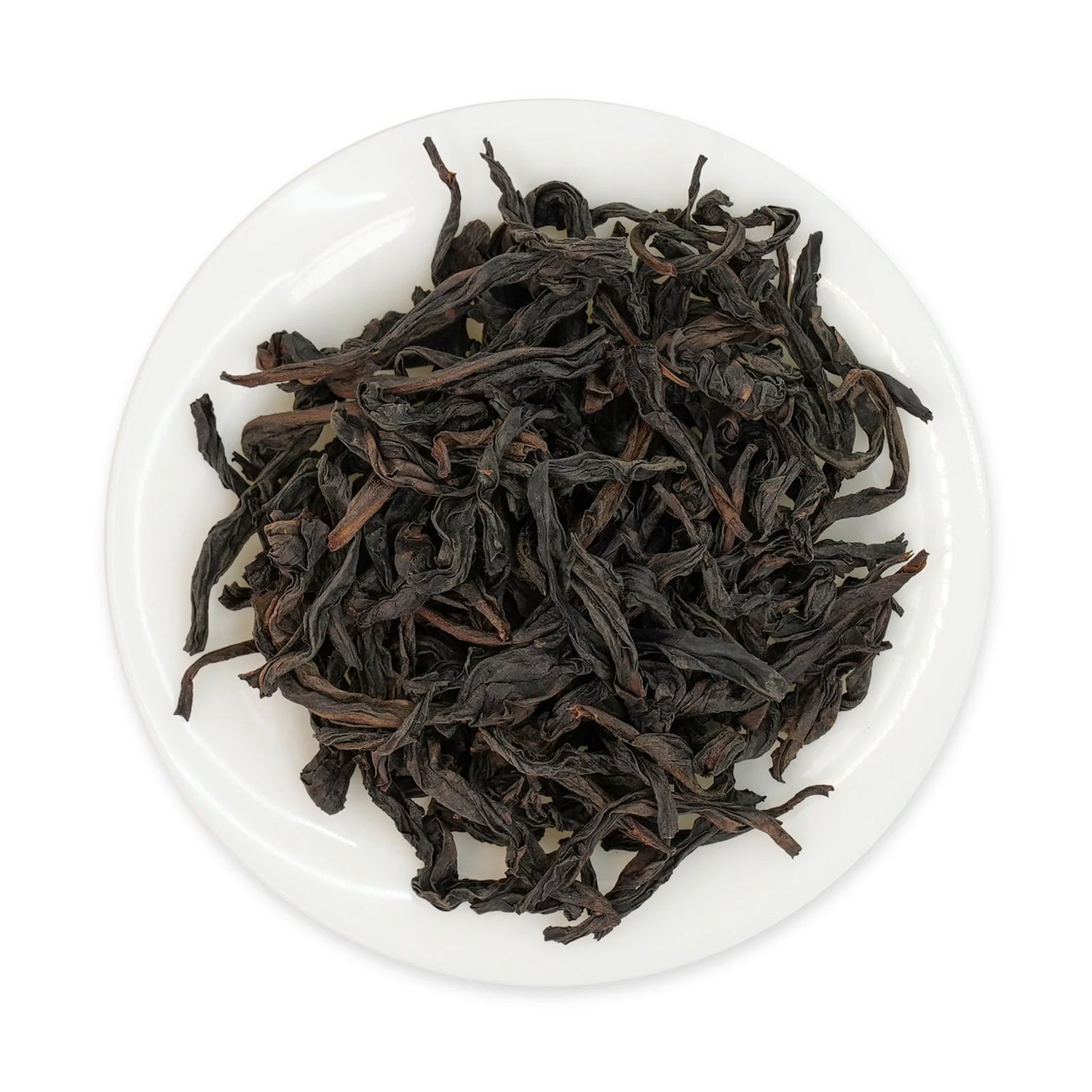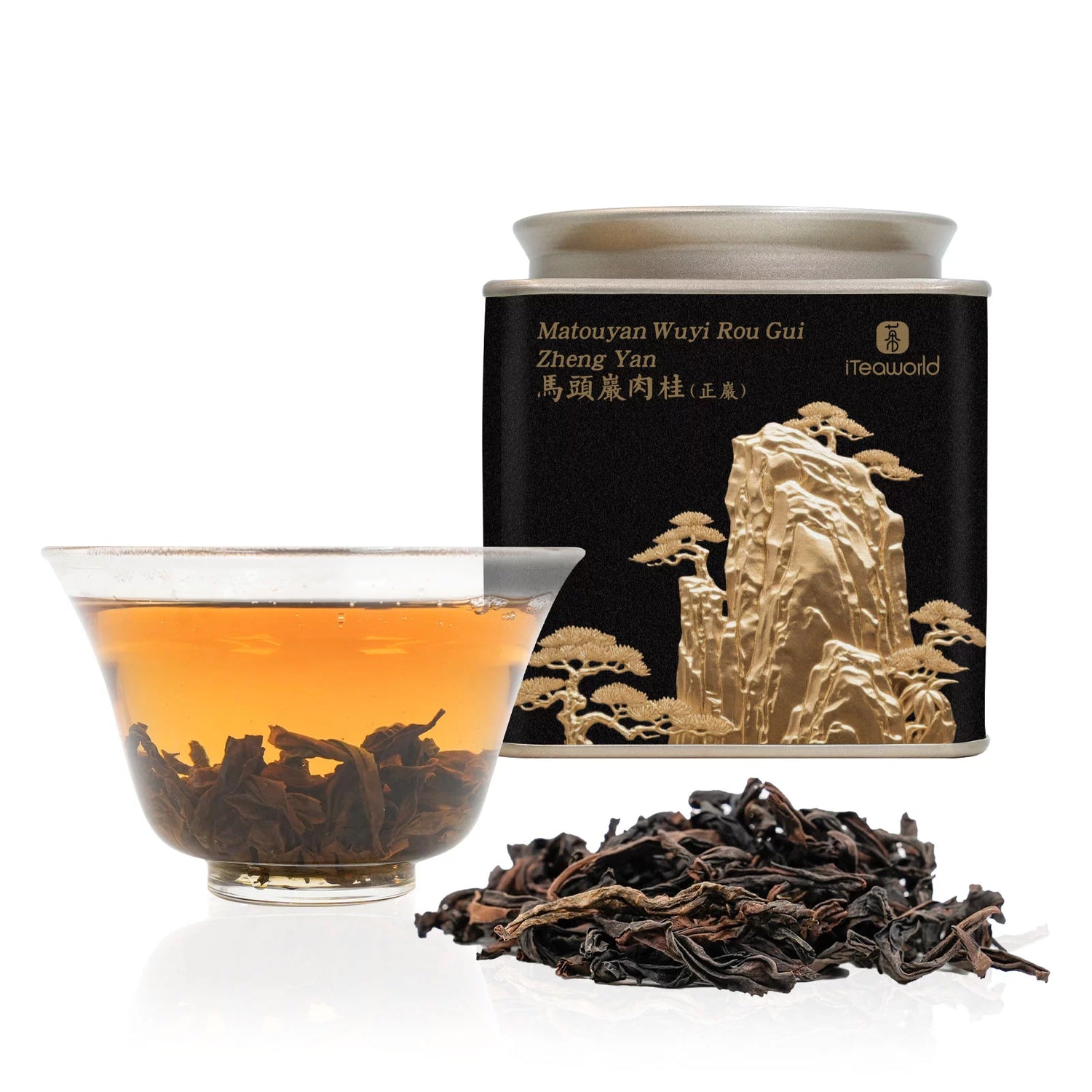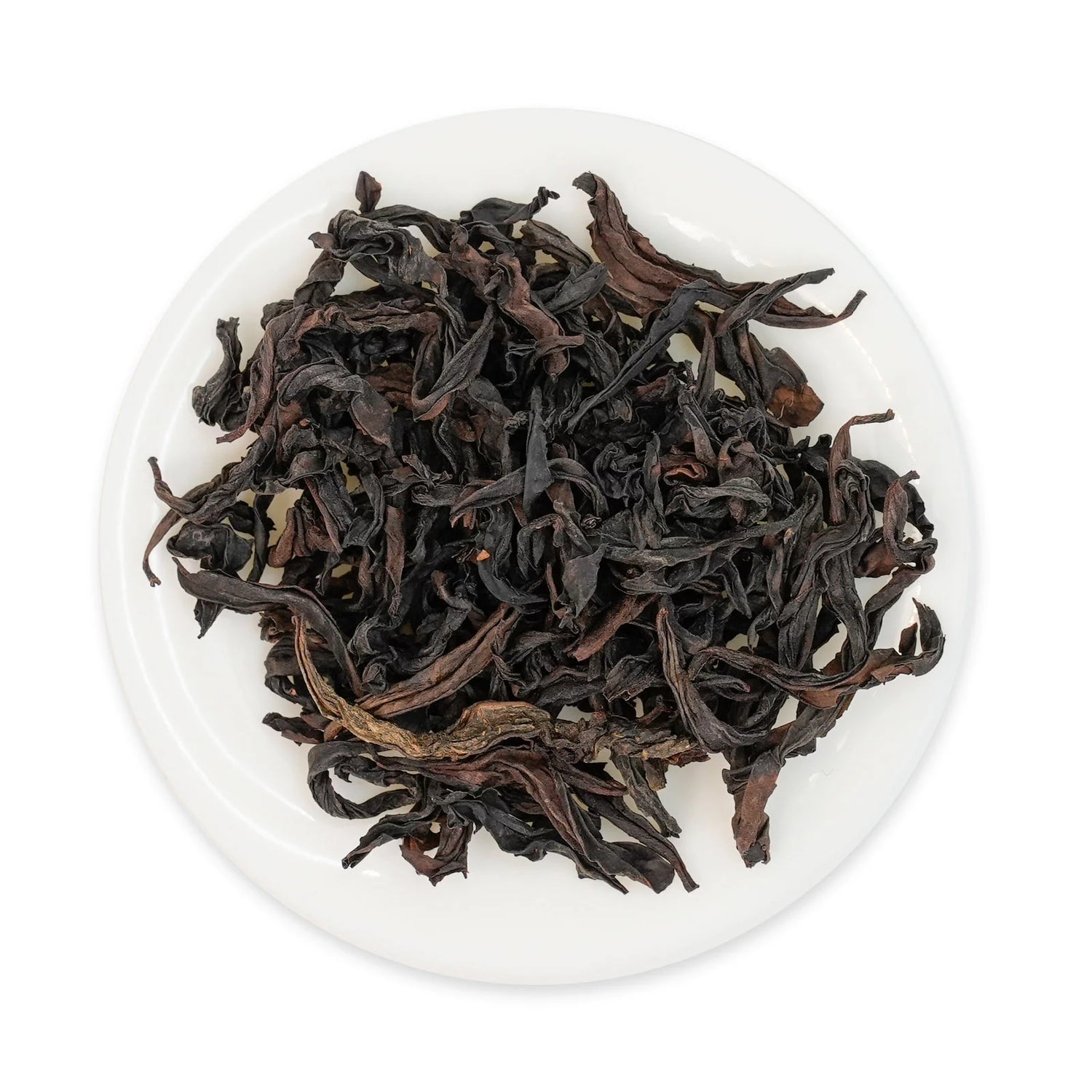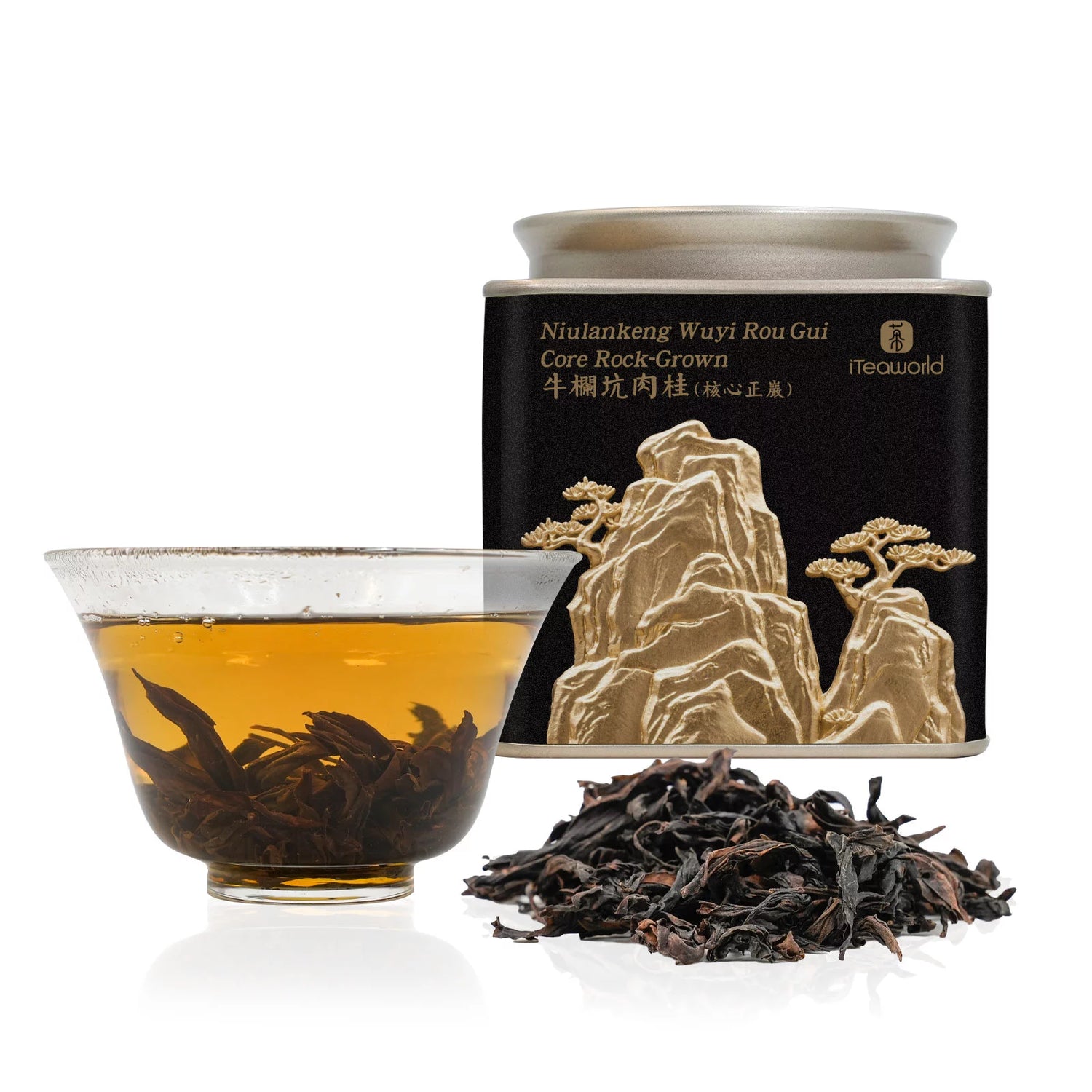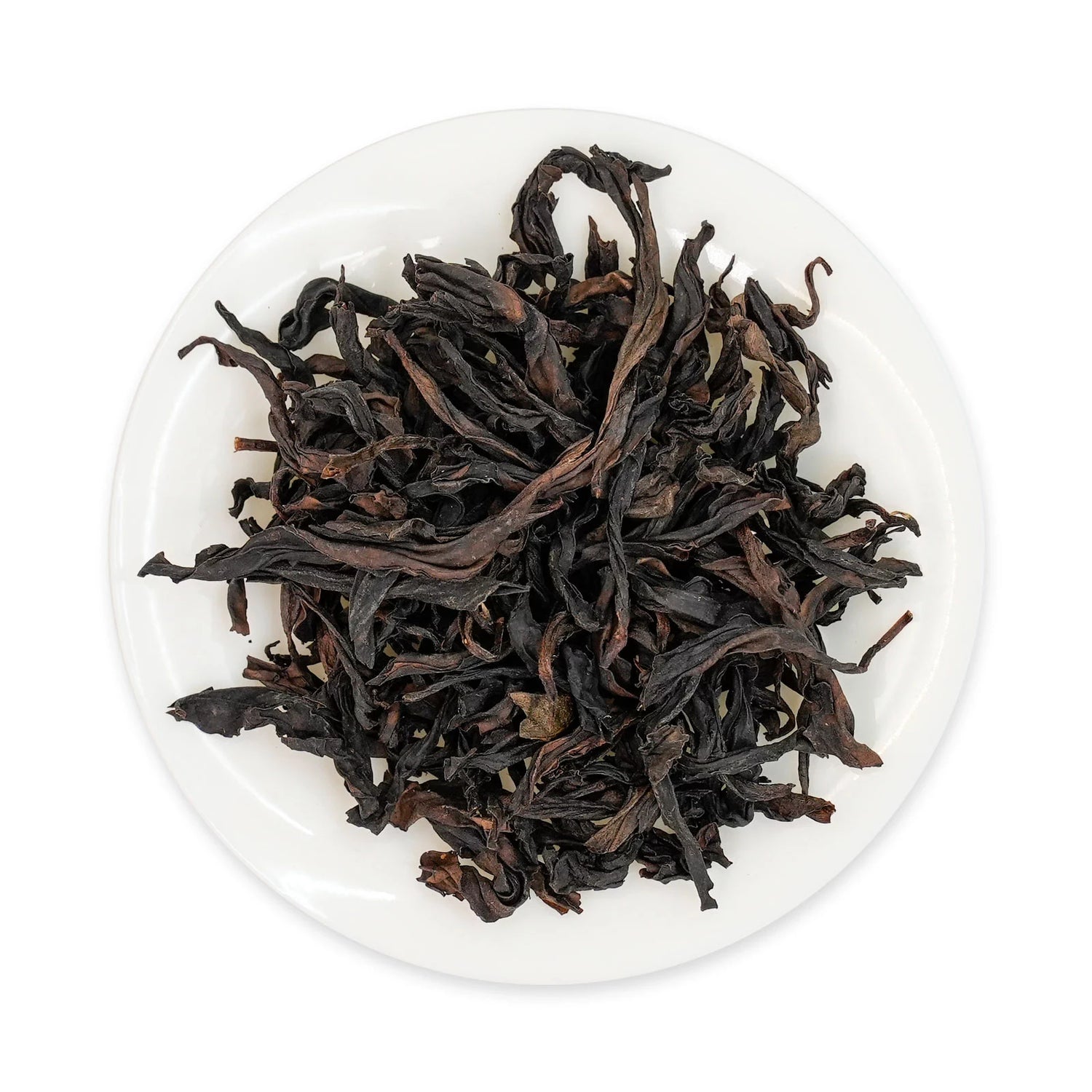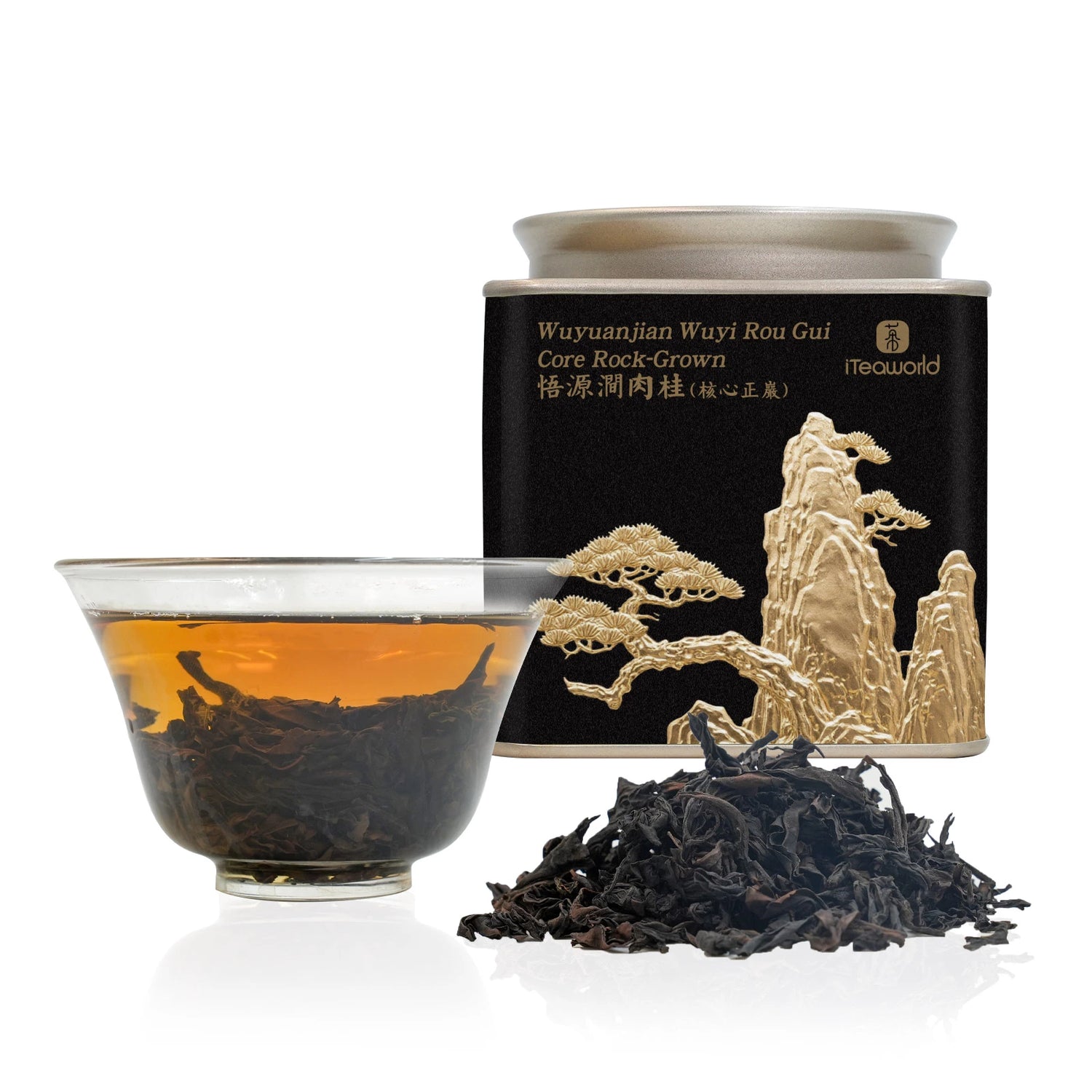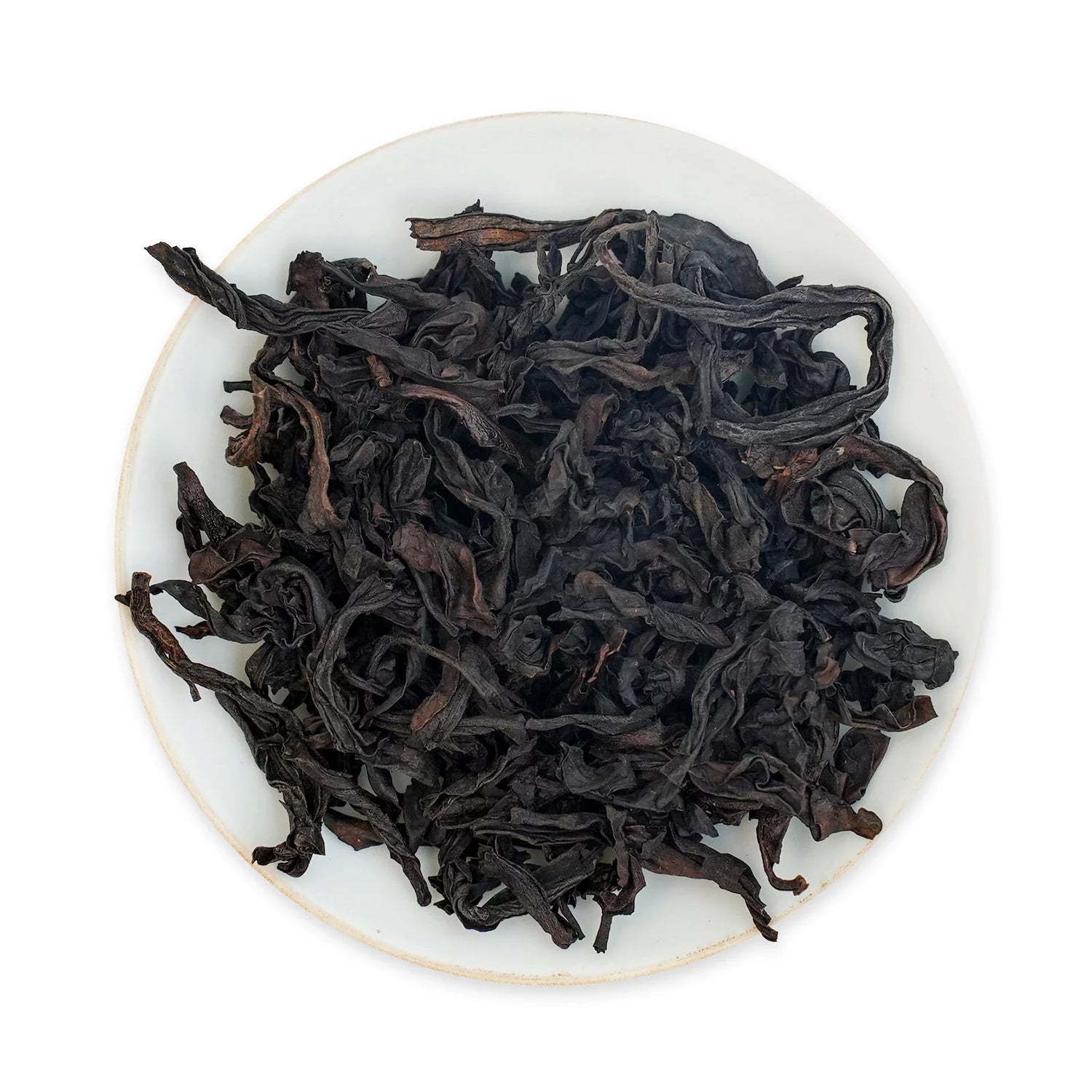Sort by:
71 products
71 products
Que She (“Sparrow’s Tongue”) was selected in the early 1980s from the sexually reproduced offspring of the No.1 Mother Tree of Da Hong Pao at Jiulongke, Wuyi Mountain. It is considered a second-generation cultivar of Da Hong Pao. Propagated through asexual reproduction, Que She retains part of the genetic traits of Da Hong Pao, yet it is not a “pure-bred Da Hong Pao” in the traditional sense. Instead, it has developed into a distinguished Wuyi cultivar with its own unique flavor profile. Its name comes from its slender and delicate leaves, resembling the tongue of a sparrow.
This tea belongs to the Ban Yan (mid-mountain) category. Its aroma is dominated by floral and fruity notes, with prominent hints of gardenia and water chestnut sweetness. The fragrance is rich and long-lasting, with a particularly elegant “cold aroma.” The liquor is smooth and mellow, sweet and full-bodied, with a clear Yan Yun (the signature mineral “rock rhyme” of Wuyi tea). It offers quick returning sweetness (hui gan) and excellent re-steeping endurance.
Que She is a treasured variety among Wuyi Rock Teas, combining the charm of Da Hong Pao with its own distinctive floral-fruity fragrance—perfect for tea connoisseurs seeking a refined tasting experience.
Origin: Jingshui Village, Xingcun Town, Wuyishan City, Fujian Province, China
Altitude: 400–600 m (Ban Yan, mid-mountain)
Soil: Gravel soil
Variety: Que She (Da Hong Pao Lineage)
Producer: Chen Hui
Harvest Time: November 2024
Storage Life: 36 months
Wuyi Shui Xian is one of the signature varieties of Wuyi Rock Tea. Alongside Rou Gui, it is known by the saying: “For mellow taste, none surpasses Shui Xian; for fragrance, none surpasses Rou Gui.” Originating from Jianyang during the Qing Dynasty, Shui Xian was later introduced to Wuyi Mountain.
The age of the tea trees plays a crucial role in Shui Xian’s character. As the trees grow older, the liquor becomes more mellow, bitterness and astringency decrease, and the flavor complexity increases.
This particular Shui Xian comes from within the Wuyi Mountain Scenic Area. It belongs to the Ban Yan (mid-mountain) category, harvested from tea bushes under 30 years old (newer growth). Crafted using traditional Wuyi Rock Tea techniques, it delivers a fresh, smooth, and sweet taste. The mineral character (Yan Yun, or “rock rhyme”) is notable, with orchid fragrance as the dominant note, complemented by hints of bamboo or zongye (bamboo leaf) aroma. The tea has no heavy roasted flavor, offers 6–8 enjoyable infusions, and is an excellent choice for tea lovers wishing to further explore the world of Wuyi Rock Tea.
Origin: Jingshui Village, Xingcun Town, Wuyishan City, Fujian Province, China
Tree Age: Under 30 years
Category: Ban Yan (mid-mountain)
Soil: Gravel soil
Variety: Wuyi Shui Xian
Producer: Chen Hui
Harvest Time: November 2024
Storage Life: 36 months
Wuyi Shui Xian is one of the flagship varieties of Wuyi Rock Tea. Together with Rou Gui, it is praised in the saying: “For mellowness, none surpasses Shui Xian; for fragrance, none surpasses Rou Gui.” It was introduced to Wuyi Mountain from Jianyang during the Qing Dynasty.
For Shui Xian, tree age is a defining factor. As the tea trees grow older, the liquor becomes more mellow and rich, bitterness and astringency diminish, and the flavor layers become increasingly complex.
This particular Shui Xian is grown at Yunü Peak, one of the famous Thirty-Six Peaks of Wuyi Mountain, within the Zheng Yan (core rock) area, the most prized origin for Wuyi Rock Tea. Crafted from tea trees over 50 years old, it carries a distinctive woody fragrance, combined with bamboo leaf (zongye) aroma and the characteristic “Cong Wei” (old tree flavor). The mineral-rich Yan Yun (rock rhyme) is especially pronounced. Compared with younger bushes, the liquor is thicker, more full-bodied, and textured, making it an ideal choice for tea lovers seeking to deepen their exploration of Wuyi Rock Tea.
Origin: Yunü Peak, Xingcun Town, Wuyishan City, Fujian Province, China
Tree Age: Over 50 years
Category: Zheng Yan (core rock area)
Soil: Gravel soil
Variety: Wuyi Shui Xian
Producer: Chen Hui
Harvest Time: November 2024
Storage Life: 36 months
Wuyi Rougui is one of the most famous varieties of Wuyi Rock Tea, named for its sharp, cinnamon-like aroma.
This Wuyi Rougui is medium charcoal-roasted. While its aroma and complexity are slightly less pronounced than core Zhengyan Rougui, the cinnamon fragrance is sharp and direct, filling the nose with the first infusion. The flavor is rich and full-bodied, with a slightly stimulating character and a touch of bitterness in the liquor. The sweet aftertaste and mouthwatering effect appear quickly, accompanied by a noticeable mineral character.
Compared to core Zhengyan Rougui, this Wuyi Rougui is an excellent choice for beginners exploring Rock Tea. It offers high value while retaining the distinctive features of Wuyi Rock Tea.
Origin: Jingshui Village, Xingcun Town, Wuyishan City, Fujian Province, China
Category: Ban Yan (mid-mountain)
Soil: Gravel soil
Variety: Wuyi Rou Gui
Producer: Chen Hui
Harvest Time: November 2024
Shelf Life: 36 months
Wuyi Rougui is one of the most famous varieties of Wuyi Rock Tea, named for its sharp, cinnamon-like aroma.
This Rougui comes from Foguoyan, one of the “Ninety-Nine Famous Rocks” of Wuyi Mountain. Foguoyan is a Zhengyan producing area known for its excellent cost-performance ratio: it offers quality comparable to core Zhengyan teas at a more accessible price. The mineral-rich soil, ample sunlight, and year-round mist create a unique microclimate ideal for tea growth.
The Rougui from Foguoyan features a pronounced rock character with a distinct cinnamon aroma, layered with fruit and floral notes. The liquor is rich, full-bodied, and lingering. Offering core-Zhengyan quality at a better price, this Rougui is perfect for tea enthusiasts looking to explore Wuyi Rock Tea in depth.
Origin: Foguoyan, Xingcun Town, Wuyishan City, Fujian Province, China
Category: Zheng Yan (core rock area)
Soil: Gravel soil
Variety: Wuyi Rou Gui
Producer: Chen Hui
Harvest Time: November 2024
Shelf Life: 36 months
Tie Luo Han is one of the four famous Wuyi Rock Tea cultivars. Its origin is said to be either Guidong or Zhuke, both located in the core Zhengyan areas of the Wuyi Mountains. In Southeast Asia, many experienced tea lovers highly esteem Tie Luo Han, sometimes even above Da Hong Pao.
This Tie Luo Han is crafted using traditional Wuyi Rock Tea techniques. The liquor opens with a rich floral aroma, followed by a subtle herbal note in the finish. The flavor is full-bodied and mellow, with a smooth, rice-like texture. Its rock character is pronounced, offering distinct mineral notes and a unique warmth. Ideal for tea enthusiasts looking to explore the depth and variety of Wuyi Rock Teas.
Origin: Jingshui Village, Xingcun Town, Wuyishan City, Fujian Province, China
Category: Ban Yan (mid-mountain, 400–600 m)
Soil: Gravel soil
Variety: Tie Luo Han
Producer: Chen Hui
Harvest Time: November 2024
Shelf Life: 36 months
One of Wuyi Mountain's four most famous teas, Shui Jin Gui gets its name from the way its tea bushes look like giant golden turtles basking in the sun. These rare plants grow on the steep cliffs of Ox Pen Ravine beneath Dugeshe Peak.
This tea strikes the perfect balance - gentle yet complex, without the overpowering intensity of other rock teas. Its signature winter plum blossom fragrance is hauntingly beautiful, like plum flowers blooming through snow. The flavor is naturally sweet and smooth, with zero bitterness even when brewed strong.
Tea lovers appreciate its sophisticated yet approachable nature, making it perfect for both connoisseurs and those new to Wuyi oolongs.
Origin: Jingshui Village, Xingcun Town, Wuyishan City, Fujian Province, China
Category: Ban Yan (mid-mountain, 400–600 m)
Soil: Gravel soil
Variety: Shui Jin Gui
Producer: Chen Hui
Harvest Time: November 2024
Shelf Life: 36 months
Brewing Guide
-
Water Temperature: 100°C (212°F)
-
Brewware: Gaiwan, Yixing clay teapot
-
Tea-to-Water Ratio: 5–7 g per 100 ml
-
1st–3rd Infusions: 8–15 seconds
-
Later Infusions: Add 5–10 seconds each time
-
Total Brews: Up to 10 infusions
One of Wuyi’s Four Famous Bushes, Ban Tian Yao is a rare and treasured tea, especially among seasoned tea drinkers. According to legend, during the Ming Dynasty, the abbot of Tianxin Temple dreamed of a white falcon being chased by a giant eagle. In its escape, the falcon dropped a glowing gemstone, which fell onto a cliffside. Later, monks discovered a tea plant growing there and carefully nurtured it. Because of its mysterious origin and ever-changing aroma, they named it “Ban Tian Yao”—meaning “Spirit Above the Clouds.”
This tea offers an evolving fragrance with each infusion. It starts with orchid and honey notes, followed by roasted almond and herbal aromas, finishing with a cool, delicate hint of plum blossom. The golden liquor is smooth and full-bodied, with a deep Yan Yun (rock rhyme) and a long, sweet aftertaste. Compared to Shuixian, it is more refined; less spicy than Rougui.
Origin: Jingshui Village, Xingcun Town, Wuyishan City, Fujian Province, China
Category: Ban Yan (mid-mountain, 400–600 m)
Soil: Gravel soil
Variety: Ban Tian Yao
Producer: Chen Hui
Harvest Time: November 2024
Shelf Life: 36 months
Brewing Guide
-
Water Temperature: 100°C (212°F)
-
Brewware: Gaiwan, Yixing clay teapot
-
Tea-to-Water Ratio: 5–7 g per 100 ml
-
1st–3rd Infusions: 8–15 seconds
-
Later Infusions: Add 5–10 seconds each time
Bai Ji Guan is one of the rarest and most refined Wuyi rock teas, with a deep connection to Taoist culture. Legend has it that Bai Yuchan, a famous Taoist master of the Song Dynasty, discovered and cultivated this unique tea. Unlike most rock teas, its leaves are pale green with serrated edges resembling a rooster’s comb—hence the name "Bai Ji Guan" (White Rooster Crest).
This tea is lightly roasted, allowing its delicate floral and herbal notes to shine. Expect a fragrance reminiscent of orchids, sweet corn silk, and a hint of bamboo leaves in the cooled cup. When brewed, it produces a crystal-clear, pale yellow liquor with a fresh, sweet, and layered aroma that evolves with each infusion. Its taste is smooth and refreshing, similar to Shuixian but with a more refined, unfolding floral character. In the world of rock teas, Bai Ji Guan stands as the refined scholar—graceful, complex, and deeply intriguing.
Origin: Jingshui Village, Xingcun Town, Wuyishan City, Fujian Province, China
Category: Ban Yan (mid-mountain, 400–600 m)
Soil: Gravel soil
Variety: Bai Ji Guan
Producer: Chen Hui
Harvest Time: November 2024
Shelf Life: 36 months
Brewing Guide
-
Water Temperature: 100°C (212°F)
-
Brewware: Gaiwan, Yixing clay teapot
-
Tea-to-Water Ratio: 5–7 g per 100 ml
-
1st–3rd Infusions: 8–15 seconds
-
Later Infusions: Add 5–10 seconds each time
Jin Mudan (Golden Peony) was developed by the Tea Research Institute of Fujian Academy of Agricultural Sciences between 1978 and 2002 through hybridization of Tieguanyin (female parent) and Huang Ti (Huang Jingui, male parent). Its name comes from the dark, glossy appearance of the dry leaves and the golden color of the leaf buds. Jin Mudan combines the “flavor” of Tieguanyin and the “fragrance” of Huang Jingui.
This Jin Mudan features a vivid, rich aroma with floral notes blending orchid and honey fragrance, which lingers even in a cold brew. The liquor is full-bodied, smooth, and delicate, with a distinct mineral taste ( rock rhyme ) and a long-lasting finish. It is often used to enhance the aroma when blending Da Hong Pao or enjoyed as a high-fragrance single-origin tea.
Origin: Jingshui Village, Xingcun Town, Wuyishan City, Fujian Province, China
Category: Ban Yan (mid-mountain, 400–600 m)
Soil: Gravel soil
Variety: Jin Mudan
Producer: Chen Hui
Harvest Time: November 2024
Shelf Life: 36 months
Brewing Guide
-
Water Temperature: 100°C (212°F)
-
Brewware: Gaiwan, Yixing clay teapot
-
Tea-to-Water Ratio: 5–7 g per 100 ml
-
1st–3rd Infusions: 8–15 seconds
-
Later Infusions: Add 5–10 seconds each time
Da Hong Pao is the most iconic and renowned tea among Wuyi Rock Teas. This top Da Hong Pao is blended with 30% zhengyan Wuyi Rock Tea and 70% banyan Wuyi Rock Tea, roasted using traditional Wuyi charcoal methods. The liquor is golden and clear, with an exceptionally rich and pure aroma free of any off-notes.
On the palate, it is mellow and smooth, with a texture reminiscent of rice soup—delicate yet full-bodied. The fragrance is perfectly integrated into the liquor, achieving an ideal balance of flavor and aroma without any roasted taste. It offers a calm, refined, and extremely pleasant drinking experience. Even after multiple infusions, the aroma remains strong and long-lasting.
Origin: Jingshui Village, Xingcun Town, Wuyishan City, Fujian Province, China
Type: Zhengyan & Banyan Blend (Half-Rock, Half-Subrock)
Soil: Gravel Soil
Producer: Chen Hui
Harvest: November 2024
Aging: 36 months
Brewing Guide:
-
Water Temperature: 100°C (212°F)
-
Brewing Vessel: Gaiwan or Yixing Clay Teapot
-
Tea-to-Water Ratio: 5–7g per 100ml
-
Infusions:
1–3 infusions: 8–15 sec
Later infusions: +5–10 sec per infusion
Wuyi Shui Xian is one of the most famous varieties of Wuyi Rock Tea. Alongside Rougui, it is famed for the saying: “No tea more mellow than Shui Xian, no tea more fragrant than Rougui.” It combines the classic rock character with rock rhyme and a rich, full-bodied liquor. Originally introduced from Jianyang during the Qing Dynasty, Wuyi Shui Xian places great emphasis on tree age: as the trees grow older, the tea becomes more mellow, with reduced bitterness and increasingly complex layers of flavor.
This Wuyi Shui Xian is made from fresh leaves of tea trees aged 30–50 years and roasted using traditional Wuyi charcoal methods. The liquor is rich and full-bodied, moderately intense with a slight astringency, a clear and lasting sweet aftertaste, and a subtle woody fragrance. The texture is smooth and refined, offering depth and complexity that invites slow, mindful tasting.
Origin: Daan Village, Yangzhuang Township, Wuyishan City, Fujian Province, China
Tree Age: 30–50 years
Type: Ban Yan (Half-Rock)
Tea Variety: Wuyi Shui Xian
Producer: Chen Hui
Harvest: May 2024
Aging: 36 months
Brewing Guide:
-
Water Temperature: 100°C (212°F)
-
Brewing Vessel: Gaiwan or Yixing Clay Teapot
-
Tea-to-Water Ratio: 5–7g per 100ml
-
Infusions:
1–3 infusions: 8–15 sec
Later infusions: +5–10 sec per infusion
Wusandi, located in the heart of the Wuyi Mountain Nature Reserve, is a high-mountain tea region renowned for its old-bush Shui Xian. Although these old-bush Shui Xian trees grow outside the Wuyi Rock tea core regions, their age and quality make them a “dark horse” among Wuyi Rock Teas, comparable to zhengyan old-bush Shui Xian, and highly favored by tea enthusiasts.
This Wuyi Shui Xian is made from tea trees over 70 years old and roasted using traditional Wuyi charcoal-roasting methods. It features a pure old-cultivar aroma (mainly woody), with a subtle floral note. The liquor is soft, smooth, and rounded, gradually deepening in flavor as it unfolds in the mouth. The harmony between tea and water feels naturally perfect, and the aroma persists through multiple infusions.
For tea lovers seeking the flavor of Wuyi Rock Tea from trees over 70 years old, this Shui Xian tea offers exceptional value for money.
Origin: Wusandi, Jiangxi Village, Yangzhuang Township, Wuyishan City, Fujian Province, China
Tree Age: Over 70 years
Altitude: 700–800m
Tea Variety: Wuyi Shui Xian
Producer: Wu Sheng
Harvest: October 2024
Aging: 36 months
Brewing Guide:
-
Water Temperature: 100°C (212°F)
-
Brewing Vessel: Gaiwan or Yixing Clay Teapot
-
Tea-to-Water Ratio: 5–7g per 100ml
-
Infusions:
1–3 infusions: 8–15 sec
Later infusions: +5–10 sec per infusion
Matouyan is one of the top producing areas of Zhengyan Wuyi Rock Tea, located adjacent to Wuyuanjian. With open terrain, ample sunlight, and purple sandy-gravel soil ideal for growing Rougui and other tea trees, it is renowned for producing exceptional teas. The Rougui from Matouyan, often called “Ma Rou”, is prized as a luxury among Rock Teas for its sharp cinnamon aroma and full-bodied taste.
This Wuyi Rougui from Matouyan features a vivid, intense cinnamon fragrance. The liquor is rich, smooth, and full-bodied, with a subtle spicy note on the tip of the tongue, followed by a sweet aftertaste and pronounced rock rhyme (mineral character). Overall, it is bold, powerful, and commanding in style.
Origin: Matouyan, Xingcun Town, Wuyishan City, Fujian Province, China
Type: Zheng Yan (True Rock)
Tea Variety: Wuyi Rougui
Producer: Chen Hui
Harvest: August 2025
Aging: 36 months
Brewing Guide:
-
Water Temperature: 100°C (212°F)
-
Brewing Vessel: Gaiwan or Yixing Clay Teapot
-
Tea-to-Water Ratio: 5–7g per 100ml
-
Infusions:
1–3 infusions: 8–15 sec
Later infusions: +5–10 sec per infusion
Niu Lan Keng is one of the core Zhengyan producing areas of Wuyi Rock Tea, belonging to the famous “Three Pits and Two Ravines.” The area is nourished year-round by flowing streams from rock crevices, with high humidity, misty air, limited sunlight inside the pit, and mineral-rich soil. These conditions create a cool, shaded environment ideal for tea trees.
The Wuyi Rougui produced here—often referred to as “Niu Rou”—is highly prized for its rarity and extremely limited yield, earning it the title “King of Rock Tea.” Its signature cinnamon note is sharp, bold, and highly penetrating, layered with osmanthus, floral, and fruity aromas. Unique to Niu Lan Keng, it also carries a distinct “ravine character”—a mossy, mineral freshness reminiscent of a primeval forest—which adds depth and authenticity to its terroir expression.
On the palate, it strikes a balance of strength and finesse: the cinnamon’s spicy sharpness is complemented by a smooth, delicate liquor, hiding inner power. The rock rhyme is pronounced, with a quick and lasting sweet aftertaste.
Origin: Niulankeng, Xingcun Town, Wuyishan City, Fujian Province, China
Type: Core Zheng Yan (Core True Rock)
Tea Variety: Wuyi Rougui
Producer: Chen Hui
Harvest: October 2024
Aging: 36 months
Brewing Guide:
-
Water Temperature: 100°C (212°F)
-
Brewing Vessel: Gaiwan or Yixing Clay Teapot
-
Tea-to-Water Ratio: 5–7g per 100ml
-
Infusions:
1–3 infusions: 8–15 sec
Later infusions: +5–10 sec per infusion
Wuyuanjian is one of the core Zhengyan producing areas of Wuyi Rock Tea, belonging to the famous “Three Pits and Two Ravines,” and is one of the two ravines. The area is shrouded in mist throughout the year, nourished by flowing streams, with a humid climate and soil rich in fine sandy gravel and minerals. Lush vegetation and this unique terroir together give birth to outstanding Wuyi Rock Teas. Among them, Rougui and Shui Xian from Wuyuanjian are especially prized for their rich fruity notes, elegant orchid fragrance, and full-bodied taste.
The Wuyi Rougui from Wuyuanjian reveals a clear and vivid cinnamon aroma at first, followed by subtle layers of orchid, woody undertones, and even a refreshing hint of mint. The fragrance is pure, distinctive, and lingers gracefully. The liquor is smooth and delicate on the palate, gradually unfolding into depth and the signature “rock rhyme.” Compared to Rougui from Niu Lan Keng, Wuyuanjian’s expression is softer and more refined—ideal for tea lovers who seek a fresh, elegant style.
Origin: Wuyuanjian, Xingcun Town, Wuyishan City, Fujian Province, China
Type: Core Zheng Yan (Core True Rock)
Tea Variety: Wuyi Rougui
Producer: Chen Hui
Harvest: October 2024
Aging: 36 months
Brewing Guide:
-
Water Temperature: 100°C (212°F)
-
Brewing Vessel: Gaiwan or Yixing Clay Teapot
-
Tea-to-Water Ratio: 5–7g per 100ml
-
Infusions:
1–3 infusions: 8–15 sec
Later infusions: +5–10 sec per infusion
Dong Pian (Winter Flake), also known as “Xue Pian,” is a seasonal tea produced in Guangdong. Because winters in this region are mild, tea plants continue to grow slowly from Lidong (Start of Winter) to Xiaoxue (Light Snow)—roughly early to late November. Tea made during this period is called Dong Pian.
At this time of year, temperatures are lower and the day–night temperature difference is larger. The slower growth allows the tea plants to accumulate more internal compounds—especially aromatic substances, amino acids, and natural sugars. These give Dong Pian its intensely fragrant, uplifting aroma and a sweet, refreshing taste with remarkable clarity.
This Duck Shit Aroma Winter Dong Pian is harvested from tea gardens at 500–700 meters on Xiyanshan in Guangdong. Compared with Winter Sprout from Phoenix Town, the higher elevation here produces a tea with stronger, cooler high notes, a clean and sweet flavor, and very low bitterness, like a gentle cold breeze in early winter. The dry leaves carry a unique creamy fragrance.
A seasonal limited-release oolong with impressive value, this tea captures the brisk beauty of early winter in every cup.
Origin: Xiyan Village, Fenglang Township, Meizhou, Guangdong, China
Elevation: 500–700m
Roast Level: Light Roast
Tea Master: 魏鸿西 Wei Hongxi
Processing Date: November 2025
Shelf Life: 36 months
Brewing Method:
① Gongfu Style (recommended):
5g per 100 gaiwan
95–100°C (203–212°F) water
Rinse quickly, then infuse 6–8+ times
Start with 10–15 seconds, increase gradually
② Western Brewing:
2g per 200ml
Steep for 1-3 minutes at 95-100°C
Re-steep up to 3 times
Recently viewed products
Chat with fellow tea lovers, ask questions, and share your tea moments.





